1. Overview
Brunei Darussalam, officially the Nation of Brunei, the Abode of Peace, is a sovereign state located on the north coast of the island of Borneo in Southeast Asia. It is bordered by the South China Sea to the north and surrounded by the Malaysian state of Sarawak. The country is divided into two geographically separate parts by Sarawak's Limbang district. Brunei is an absolute monarchy governed by the Sultan, who is also the Head of State and Head of Government. The nation's philosophy is Melayu Islam Beraja (Malay Islamic Monarchy), which emphasizes Malay culture, Islamic values, and the monarchy.
Brunei's history dates back to early kingdoms in northwestern Borneo, with influences from the Srivijaya and Majapahit empires. The Sultanate of Brunei was established with the arrival of Islam in the 14th century and experienced a golden age as a maritime trading empire between the 15th and 17th centuries. European intervention from the 17th century led to a period of decline and territorial losses. In 1888, Brunei became a British protectorate. The discovery of oil in 1929 significantly transformed its economy. Brunei was occupied by Japan during World War II. It achieved self-governance in 1959 and full independence from the United Kingdom on January 1, 1984.
The economy of Brunei is heavily reliant on its extensive petroleum and natural gas reserves, which account for the majority of its GDP and export earnings. This wealth has enabled Brunei to provide its citizens with a high standard of living, including free education and healthcare, and extensive social welfare programs. The country has a high Human Development Index. In recent years, Brunei has been working towards economic diversification through its Wawasan Brunei 2035 (Brunei Vision 2035) plan.
Socially and culturally, Brunei is predominantly Malay and Islamic. The implementation of Sharia law in phases since 2014 has drawn international attention and raised concerns regarding human rights, particularly for women, children, LGBT individuals, and religious minorities. Freedom of expression and assembly are restricted.
Brunei is a member of several international organizations, including the United Nations, ASEAN, the Organisation of Islamic Cooperation, and the Commonwealth of Nations. It maintains close ties with neighboring countries and engages in regional and international diplomacy. Territorial disputes in the South China Sea and with Malaysia over Limbang remain part of its foreign relations landscape.
2. Name
The official name of the country is Brunei Darussalam. In Malay, this is Negara Brunei DarussalamNəgarə Brunaj Darussalam (Nation of Brunei, the Abode of Peace)Malay, which translates to "Nation of Brunei, the Abode of Peace". The term NegaraNəgarə (country)Malay means "country" or "nation," while DarussalamDarussalam (Abode of Peace)Malay (دار السلامDār as-SalāmArabic) is an Arabic phrase meaning "Abode of Peace" or "Home of Peace." This appellation was reportedly given in the 15th century by the third Sultan, Sharif Ali, to emphasize Islam as the state religion and promote its spread. While the full Malay name is Negara Brunei DarussalamNəgarə Brunaj DarussalamMalay, in English, the official name is commonly rendered as Brunei Darussalam. The short form is simply Brunei (English pronunciation: broo-NYE; BruneiBrunaj (Malay pronunciation)Malay).
According to local historiography, Brunei was founded by Awang Alak Betatar, who later became Sultan Muhammad Shah, the first Muslim ruler of Brunei, around AD 1400. He is said to have moved from Garang in the Temburong area to the Brunei River estuary. Upon landing, he purportedly exclaimed, Baru nah!Baru nah! (That's it!/There!)Malay (loosely translated as "That's it!" or "There!"), from which the name "Brunei" is said to have been derived. The name was later "Barunai" in the 14th century, possibly influenced by the Sanskrit word वरुणvaruṇa (seafarers/god of seas)Sanskrit, meaning "seafarers" or the Hindu deity of the seas. The name "Borneo" is believed to share the same origin.
Early Chinese records referred to Brunei by names such as 婆利Pó-liChinese, 婆羅Pó-luóChinese, 渤泥Pó-níChinese or PuniPuniChinese, and 文萊WénláiChinese or 汶萊WènláiChinese (still used in modern Chinese). Arab records referred to it as 'Dzabaj' or 'Randj'. The earliest Western documentation of Brunei is by the Italian traveler Ludovico di Varthema in the early 16th century, who referred to the island as "Bornei".
3. History
The history of Brunei Darussalam spans from ancient chiefdoms and empires to its emergence as an Islamic sultanate, a period as a British protectorate, and finally its status as a modern independent nation. Key themes in its history include its maritime power, the influence of Islam, colonial encounters, the discovery of oil, and its path to sovereignty.
3.1. Early History
Archaeological research indicates that areas now constituting Brunei participated in the Maritime Jade Road, a trade network that existed for 3,000 years, from 2000 BC to 1000 AD.
The settlement known as Vijayapura, believed to be located in northwestern Borneo, was a vassal-state of the Buddhist Srivijayan empire and is thought to have flourished in the 7th century. Vijayapura itself may have been a rump state of the fallen Funan Civilization. Arab sources referred to this Srivijayan-influenced entity in Borneo as "Sribuza."
One of the earliest Chinese records of an independent kingdom in Borneo is a letter dated 977 AD sent to the Chinese emperor from the ruler of Boni (渤泥), which scholars believe refers to Borneo or Brunei. The Bruneians are thought to have regained independence from Srivijaya following a Javanese-Sumatran war. In 1225, the Chinese official Zhao Rukuo reported in his work Zhu Fan Zhi that Boni possessed 100 warships to protect its trade and was a wealthy kingdom. Marco Polo suggested in his memoirs that the Great Khan (ruler of the Mongol Empire) made several failed attempts to invade "Great Java," a term Europeans used for Borneo, which was then under Bruneian influence.
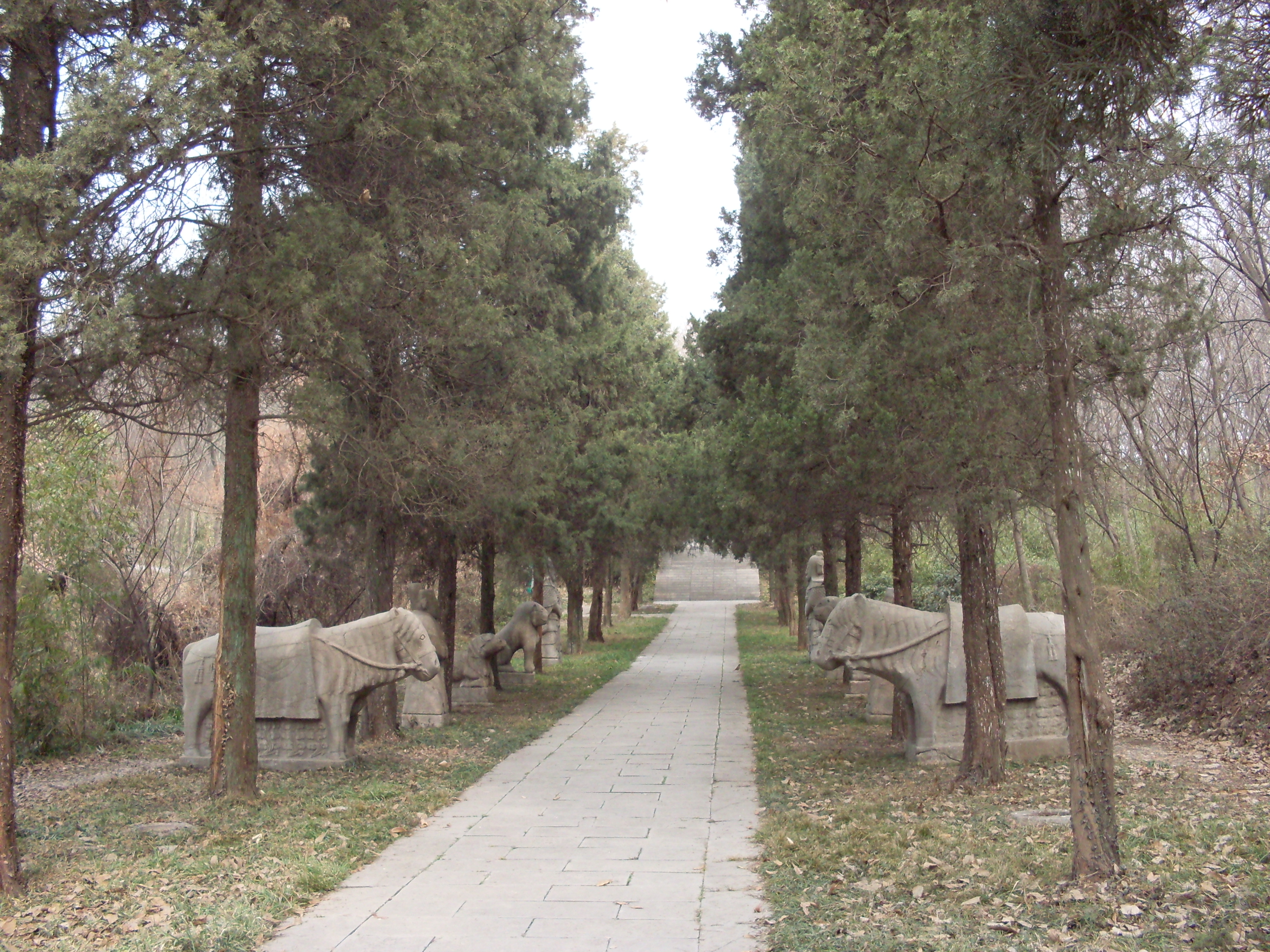
According to Wang Zhenping, in the 1300s, the Yuan Dade Nanhai Zhi (Yuan dynasty Dade period southern sea records) reported that Brunei conquered or administered Sarawak and Sabah, as well as the Philippine kingdoms of Butuan, Sulu, Ma-i (Mindoro), Malilu (Manila), Shahuchong (Siocon or Zamboanga), Yachen (Oton), and Wenduling (Mindanao), though these would later regain independence.
In the 14th century, the Javanese manuscript Nagarakretagama, written by Prapanca in 1365, mentioned Barune as a constituent state of the Hindu Majapahit empire, required to pay an annual tribute of 40 katis of camphor. In 1369, Sulu, also formerly part of Majapahit, successfully rebelled and attacked Boni, invading the northeast coast of Borneo and looting the capital of its treasure and gold, including two sacred pearls. A fleet from Majapahit succeeded in driving away the Sulus, but Boni was left weaker. A Chinese report from 1371 described Boni as poor and totally controlled by Majapahit. When the Chinese admiral Zheng He visited Brunei in the early 15th century, he noted a significant trading port with Chinese merchants actively trading with China.
3.2. Formation and Development of the Sultanate
In the 15th century, Boni seceded from Majapahit and converted to Islam, transforming into the independent Sultanate of Brunei. The first Sultan was Muhammad Shah (formerly Awang Alak Betatar), who reigned from around 1363 or 1368 to 1402. Brunei became a Hashemite state when it allowed the Arab Emir of Mecca, Sharif Ali, to become its third sultan after marrying the daughter of the preceding Sultan Ahmad. Sultan Sharif Ali (reigned 1425-1432) further solidified Islam in Brunei.
The Sultanate reached its golden age during the reign of Sultan Bolkiah (1485-1528). The empire is claimed to have controlled most of Borneo, including modern-day Sarawak and Sabah, as well as the Sulu Archipelago and islands off the northwestern tip of Borneo. There are also claims of historical control over Seludong (believed by some to be Manila, or Mount Selurong in Indonesia, or Serudong River in eastern Sabah). The Bruneian Sultan intervened in a territorial conflict between Hindu Tondo and Muslim Manila in the Philippines by appointing the Bruneian-descended Rajah Ache of Manila as admiral of the Bruneian navy. The Magellan expedition's surviving crew, led by Juan Sebastián Elcano, visited Brunei in 1521. Antonio Pigafetta, the expedition's chronicler, noted that Ache, under orders from the Sultan of Brunei, had previously sacked the Buddhist city of Loue in Southwest Borneo for remaining faithful to the old religion and rebelling against the Sultanate's authority.
During the reign of Sultan Saiful Rijal (1533-1581), Brunei fought the Castilian War (also known as the War of the Castilian Expedition) against Spain in 1578. Spain, based in Manila, aimed to capture Brunei's capital, Kota Batu, aided by two Bruneian noblemen, Pengiran Seri Lela and Pengiran Seri Ratna, who sought Spanish help to regain the throne usurped by Saiful Rijal. A Spanish fleet led by Captain-General Francisco de Sande arrived from Mexico via the Philippines. The force, consisting of Spaniards, Mexicans, Filipino natives, and Borneans, captured Kota Batu on April 16, 1578. Sultan Saiful Rijal was forced to flee. However, the Spanish suffered high fatalities due to a cholera or dysentery outbreak and decided to abandon Brunei, returning to Manila on June 26, 1578, after 72 days. Pengiran Seri Lela died shortly after, possibly from the same illness. His daughter, a Bruneian princess, left with the Spanish, renounced her claim to the crown, and married a Christian Tagalog, Agustín de Legazpi de Tondo. Local Bruneian accounts differ, portraying the war as a heroic episode where the Spaniards were driven out by Bendahara Sakam, a brother of the ruling Sultan.
3.3. European Intervention and Decline
From the 17th century onwards, the Bruneian Empire began to decline due to internal strife over royal succession, colonial expansion by European powers, and the disruption of traditional trading patterns. The Ottoman Caliphate provided some aid to Southeast Asian sultanates, including making Aceh a protectorate and sending expeditions to train local forces. There is evidence of Turks migrating to Brunei during this period. The Brunei Civil War (1660-1673) further weakened the Sultanate. In 1658, the Sultan of Brunei had gifted the northeast coast of Borneo to the Sultan of Sulu in gratitude for assistance in settling a civil war.
European powers like the Netherlands and Great Britain increasingly encroached upon Brunei's sphere of influence. In the 19th century, the decline accelerated. In 1839, British adventurer James Brooke arrived in Sarawak. He helped Sultan Omar Ali Saifuddin II quell a rebellion by local Malay Datus and Bidayuh people. As a reward, in 1841, Brooke was granted the governorship of Sarawak, which was later upgraded to the title of Rajah. He and his successors, the White Rajahs, gradually expanded Sarawak's territory at Brunei's expense.
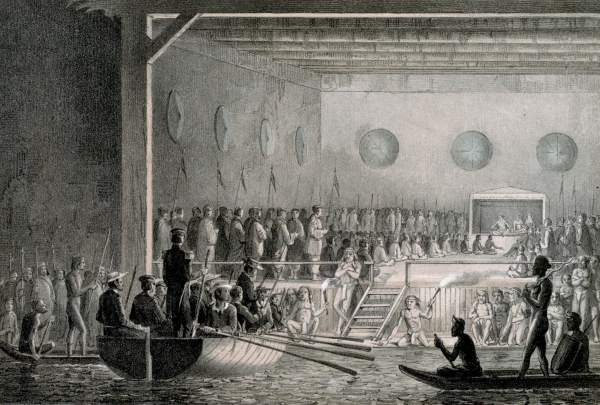
In July 1846, Britain attacked Brunei due to internal conflicts over who was the rightful Sultan and in response to perceived piracy. This led to the Treaty of Labuan in December 1846, under which Sultan Omar Ali Saifuddin II ceded the island of Labuan to Great Britain. Simultaneously, the British North Borneo Chartered Company was expanding its control in northeastern Borneo, further diminishing Brunei's territory.
3.4. British Protectorate Period
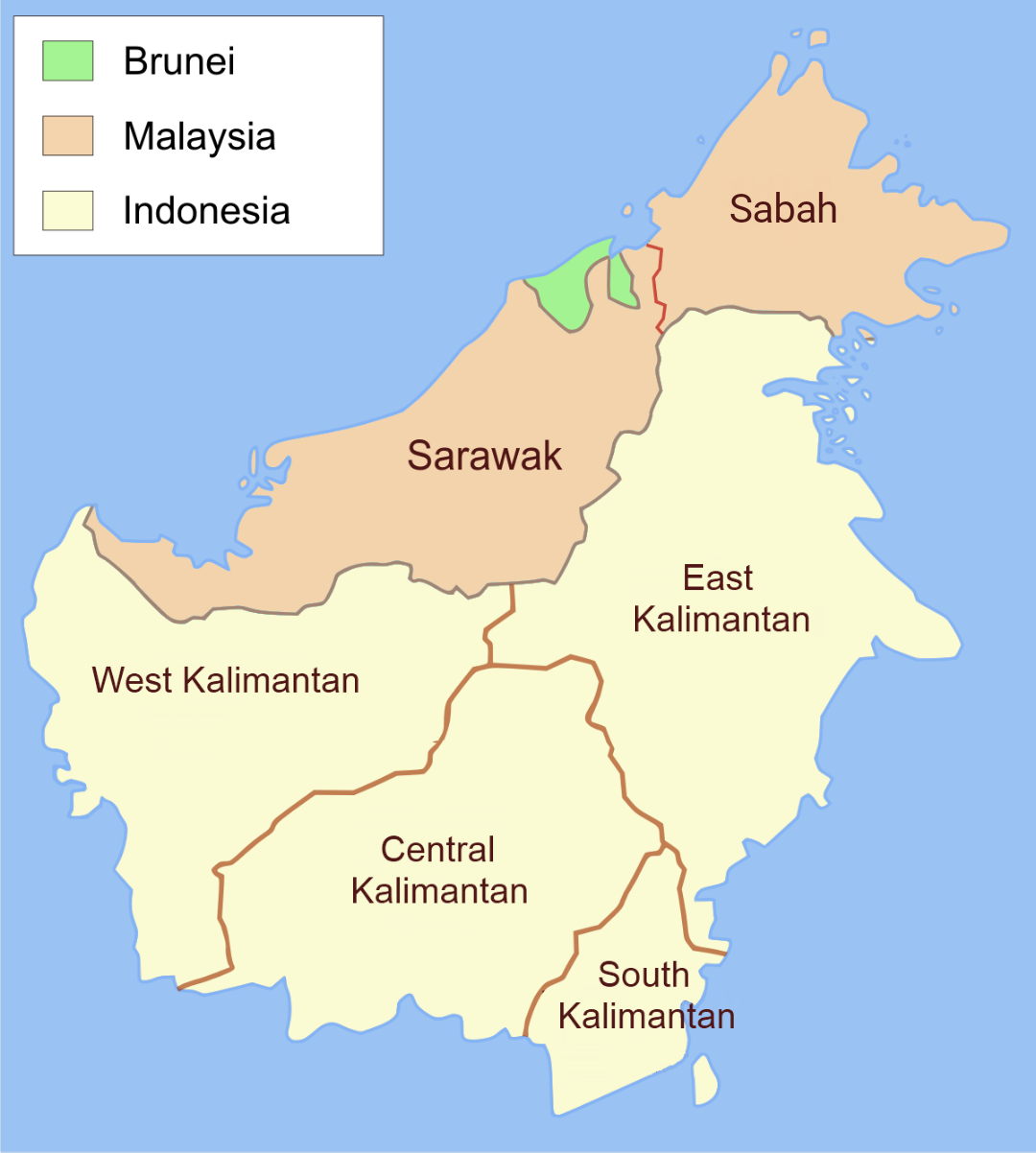
Faced with continuous territorial losses to the White Rajahs of Sarawak and the North Borneo Chartered Company, Sultan Hashim Jalilul Alam Aqamaddin appealed to the British for protection. The "Treaty of Protection" was negotiated by Sir Hugh Low and signed on September 17, 1888. Under this treaty, the Sultan agreed not to cede or lease any territory to foreign powers without British consent, effectively giving Britain control over Brunei's external affairs. Brunei became a British protectorate.
However, when the Raj of Sarawak annexed Brunei's Pandaruan District (now Limbang) in 1890, the British did not intervene, as they did not consider Sarawak "foreign" under the terms of the treaty. This annexation left Brunei with its current small landmass, split into two non-contiguous parts.
In 1904, British Consul Malcolm Stewart Hannibal McArthur produced the "Report on Brunei," recommending the implementation of a British Residency system similar to that in the Federated Malay States. Under the Supplementary Protectorate Agreement of 1906, a British Resident was appointed to advise the Sultan on all matters of administration except those concerning Malay customs and Islam. Over time, the Resident assumed more executive control than the Sultan.
The discovery of oil in 1929 near Seria by F.F. Marriot and T.G. Cochrane marked a turning point for Brunei's economy. The first commercial oil well, Seria Well Number One (S-1), was drilled on July 12, 1928, and struck oil on April 5, 1929. The British Malayan Petroleum Company (later Brunei Shell Petroleum) was formed in 1922. Oil production increased significantly in the 1930s, providing a new economic foundation for the protectorate. By 1940, oil production exceeded six million barrels.
3.5. Japanese Occupation Period
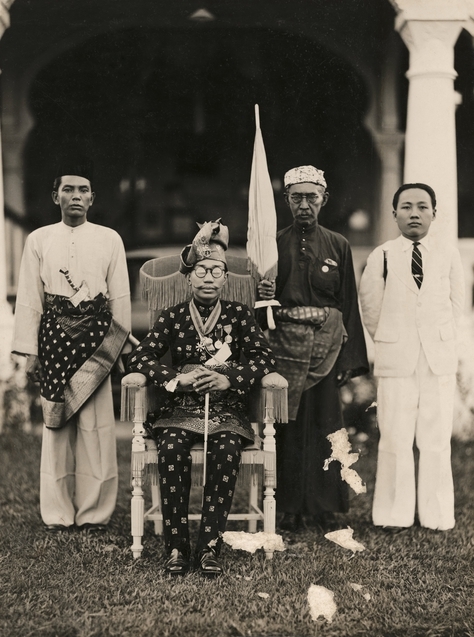
On December 16, 1941, eight days after the attack on Pearl Harbor, Japanese forces invaded Brunei. The Kawaguchi Detachment, consisting of 10,000 troops, landed at Kuala Belait from Cam Ranh Bay. After six days of fighting, they occupied the entire country. The only Allied troops in the area were the 2nd Battalion of the 15th Punjab Regiment based in Kuching, Sarawak.
The Japanese made an agreement with Sultan Ahmad Tajuddin regarding the governance of the country. Inche Ibrahim (later Pehin Datu Perdana Menteri Dato Laila Utama Awang Haji Ibrahim), former Secretary to the British Resident, was appointed chief administrative officer under the Japanese Governor. The Sultan retained his throne and received a pension and honors from the Japanese. During the later part of the occupation, he resided in Limbang and had limited interaction with the Japanese. Most Malay government officers were retained. Brunei's administration was reorganized into five prefectures, which included British North Borneo, Baram, Labuan, Lawas, and Limbang.
The Japanese language was taught in schools, and government officers were required to learn it. The local currency was replaced by Japanese-issued "banana money" (duit pisangduit pisang (banana money)Malay), which became worthless due to hyperinflation by the end of the war. Allied attacks on shipping disrupted trade, leading to shortages of food and medicine, causing famine and disease.
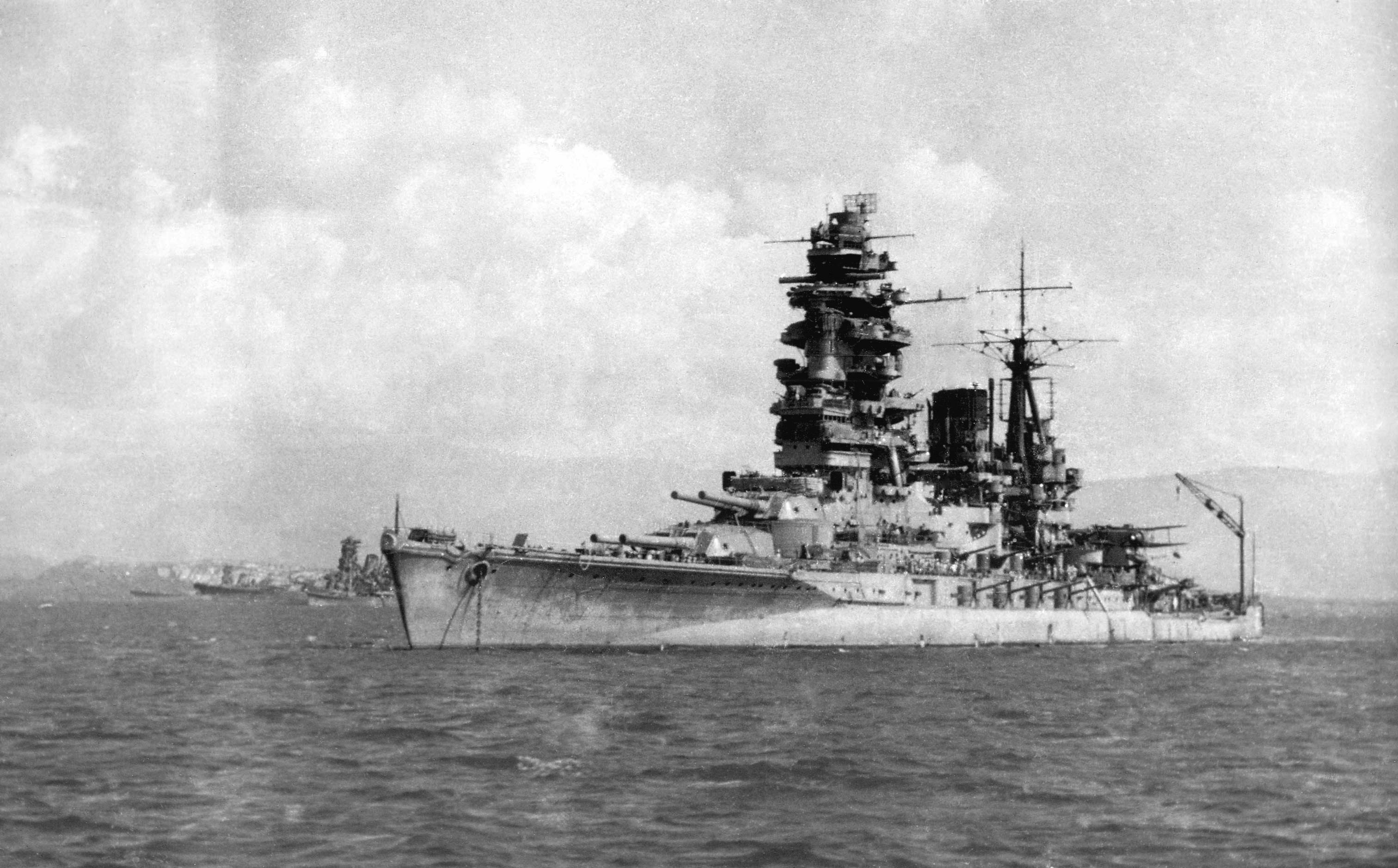
The Japanese constructed an airport runway during the occupation. In 1943, Japanese naval units were based in Brunei Bay and Labuan. The naval base was later destroyed by Allied bombing, but the runway survived and was developed into a public airport.
Anticipating the Japanese attack, British forces had filled in the Seria oilfield wells with concrete in September 1941 to deny their use to the Japanese. Remaining equipment was destroyed during the Malayan Campaign. By the end of the war, 16 wells at Miri and Seria had been restarted, but production was about half the pre-war level.
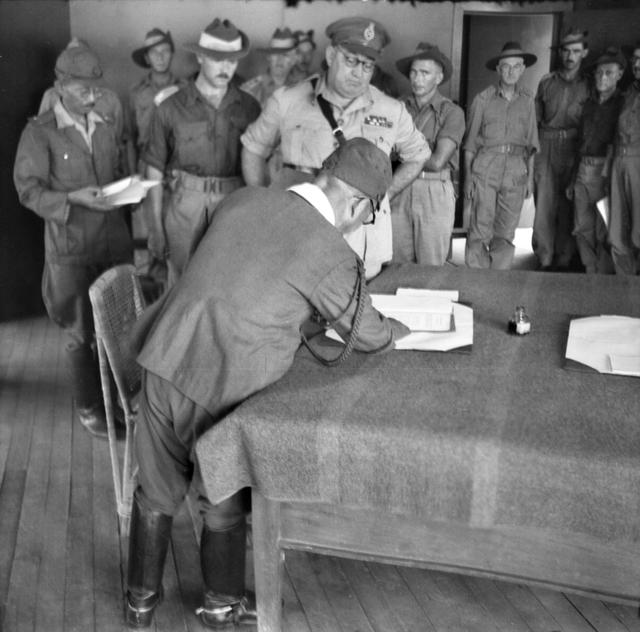
On June 10, 1945, the Australian 9th Division landed at Muara under Operation Oboe Six to recapture Borneo. Supported by American air and naval units, Brunei town was extensively bombed and recaptured after three days of heavy fighting. Many buildings, including the main mosque, were destroyed. Japanese forces in Brunei, Borneo, and Sarawak, under Lieutenant-General Masao Baba, formally surrendered at Labuan on September 10, 1945. The British Military Administration (BMA) took over and remained until July 1946.
3.6. Post-World War II and Independence
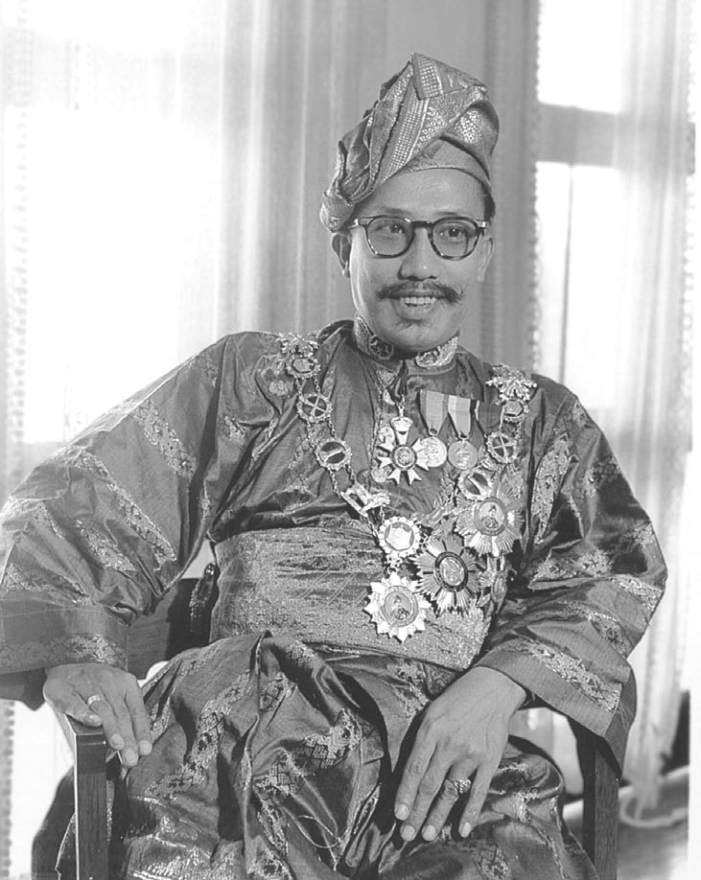
After World War II, Brunei was governed by the British Military Administration (BMA), primarily composed of Australian officers and servicemen. The BMA's tasks included reviving the Bruneian economy and extinguishing oil well fires set by the Japanese. Civil administration was restored on July 6, 1945, and the Brunei State Council was revived.
The first political party in Brunei, Barisan Pemuda (BARIP, "Youth Front"), was formed on April 12, 1946, aiming to preserve the Sultan's sovereignty and defend Malay rights. It contributed to the composition of the national anthem but dissolved in 1948 due to inactivity.
In July 1953, Sultan Omar Ali Saifuddien III formed a seven-member committee, Tujuh Serangkai, to gather citizens' views on a written constitution. Following discussions with British officials, a draft constitution was authorized. On September 29, 1959, the Constitution Agreement was signed in Brunei Town (now Bandar Seri Begawan) by Sultan Omar Ali Saifuddien III and Sir Robert Scott, the Commissioner-General for Southeast Asia. The 1959 constitution declared Brunei a self-governing state, with the United Kingdom retaining responsibility for foreign affairs, security, and defense. The Sultan became the Supreme Head of State, Brunei managed its internal administration, and the post of British Resident was abolished, replaced by a British High Commissioner. Five councils were established: the Executive Council, the Legislative Council (Majlis Mesyuarat NegaraMajlis Məsyuarat Nəgara (Legislative Council)Malay), the Privy Council, the Council of Succession, and the State Religious Council.
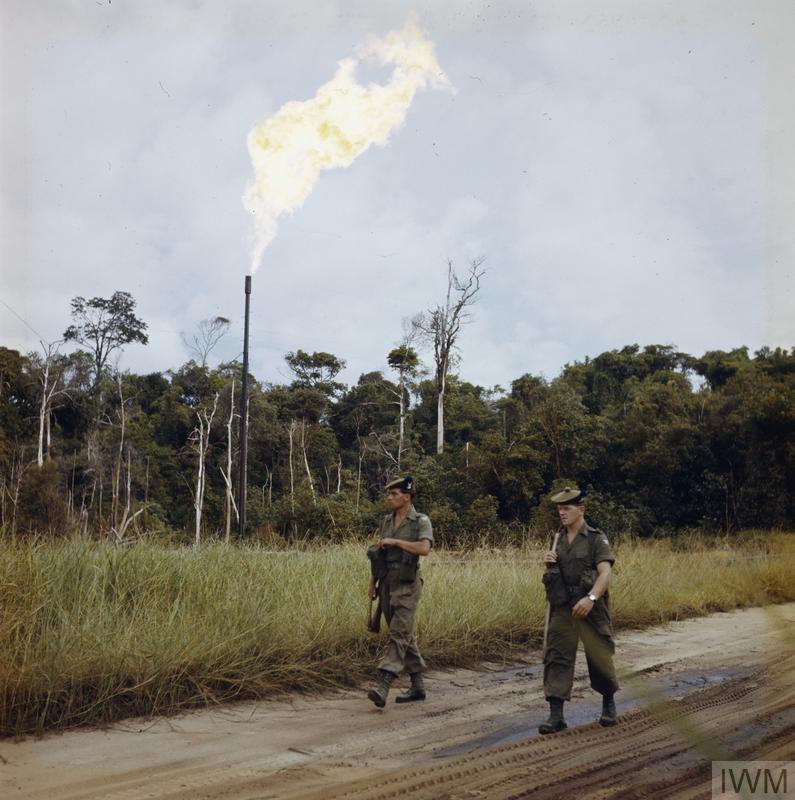
In 1962, the Brunei People's Party (PRB), which advocated for full independence and the creation of a North Borneo Federation (comprising Brunei, Sarawak, and North Borneo/Sabah), won all elected seats in the Legislative Council. However, their demands for an end to the Sultanate and full democracy were rejected. This led to the Brunei Revolt in December 1962, an armed rebellion by the PRB's military wing, the North Kalimantan National Army (TNKU). The revolt was swiftly suppressed with the help of British troops, including Gurkhas, dispatched from Singapore. Following the revolt, the PRB was banned, and a state of emergency was declared, which has been renewed every two years since. The revolt influenced the Sultan's decision not to join the Federation of Malaysia when it was formed in 1963.
Sultan Omar Ali Saifuddien III abdicated in 1967, and his eldest son, Hassanal Bolkiah, became the 29th Sultan. Omar Ali Saifuddien III later became Minister of Defence after independence and was titled Paduka Seri Begawan Sultan. In 1970, Brunei Town was renamed Bandar Seri Begawan in his honor.
On November 14, 1971, Sultan Hassanal Bolkiah signed a new agreement with the British, granting Brunei full internal self-government, while the UK remained responsible for external affairs and defense, with shared responsibility for security. This agreement also led to the deployment of Gurkha units in Brunei.
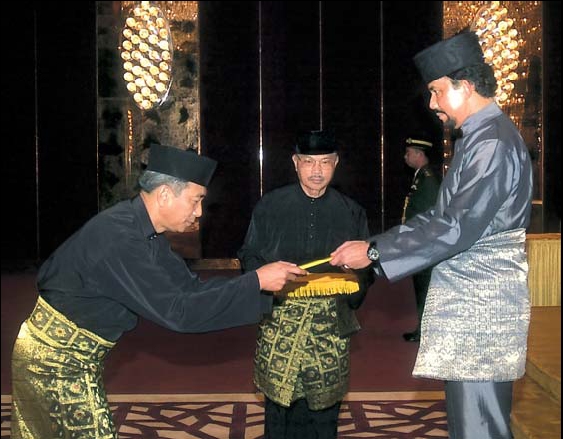
On January 7, 1979, a further treaty was signed between Brunei and the United Kingdom, paving the way for Brunei to assume international responsibilities as an independent nation. Britain agreed to assist Brunei in diplomatic matters. In May 1983, the UK announced that Brunei's independence date would be January 1, 1984.
On December 31, 1983, mass gatherings were held at mosques across the country. At midnight on January 1, 1984, Sultan Hassanal Bolkiah read the Proclamation of Independence. The Sultan subsequently assumed the title "His Majesty," rather than the previous "His Royal Highness." Brunei was admitted to the United Nations on September 22, 1984, becoming its 159th member. The official National Day is celebrated on February 23rd.
National development plans were initiated by Sultan Omar Ali Saifuddien III. The first, introduced in 1953 with a budget of B$100 million, included the construction of a gas plant and infrastructure improvements like roads and the Berakas Airport. The second plan, launched in 1962, focused on increasing oil and gas production, promoting agriculture, and developing the deepwater port at Muara. Efforts were also made to improve public health, including eradicating malaria.
3.7. 21st Century
In the 21st century, Brunei has continued to be governed by Sultan Hassanal Bolkiah. The country has focused on its long-term development plan, Wawasan Brunei 2035 (Brunei Vision 2035), which aims to diversify the economy away from heavy reliance on oil and gas, develop human capital, and ensure sustainable development.
A major social and legal development has been the phased implementation of Sharia criminal law. In October 2013, Sultan Hassanal Bolkiah announced the intention to impose Sharia law on the country's Muslims. This was implemented in three phases, starting in April 2014. The first phase included offenses punishable by fines or imprisonment. Subsequent phases, fully implemented by April 2019, introduced harsher penalties, including corporal punishment (caning), amputation for theft, and stoning to death for offenses such as adultery and homosexual acts. This move made Brunei the first country in East Asia to introduce Sharia law into its penal code at the national level (excluding subnational regions like Aceh in Indonesia). The implementation attracted significant international criticism from governments, human rights organizations, and celebrities, with the United Nations expressing "deep concern" over the severity of the punishments and their incompatibility with international human rights law. In May 2019, in response to the backlash, the Sultan announced a moratorium on the death penalty for cases under the Sharia penal code, extending an existing moratorium on capital punishment under common law. However, concerns about the broader impact of Sharia law on human rights, including freedom of religion, expression, and the rights of women and LGBT individuals, persist.
Brunei has maintained its role in international organizations such as ASEAN, chairing the organization in 2013 and 2021. It continues to navigate territorial disputes in the South China Sea and the Limbang border issue with Malaysia.
4. Geography
Brunei Darussalam is a Southeast Asian country situated on the northern coast of the island of Borneo. It consists of two geographically unconnected parts, separated by the Malaysian state of Sarawak. The country has a total land area of 2.2 K mile2 (5.76 K km2). It features a 100 mile (161 km) coastline along the South China Sea to the north and shares a 237 mile (381 km) border with Malaysia. Brunei's territorial waters extend to 193 mile2 (500 km2), and it claims a 200-nautical mile (370 km; 230 mi) exclusive economic zone.
This section will further explore the country's topography, climate, natural environment, and biodiversity.
4.1. Topography and Climate
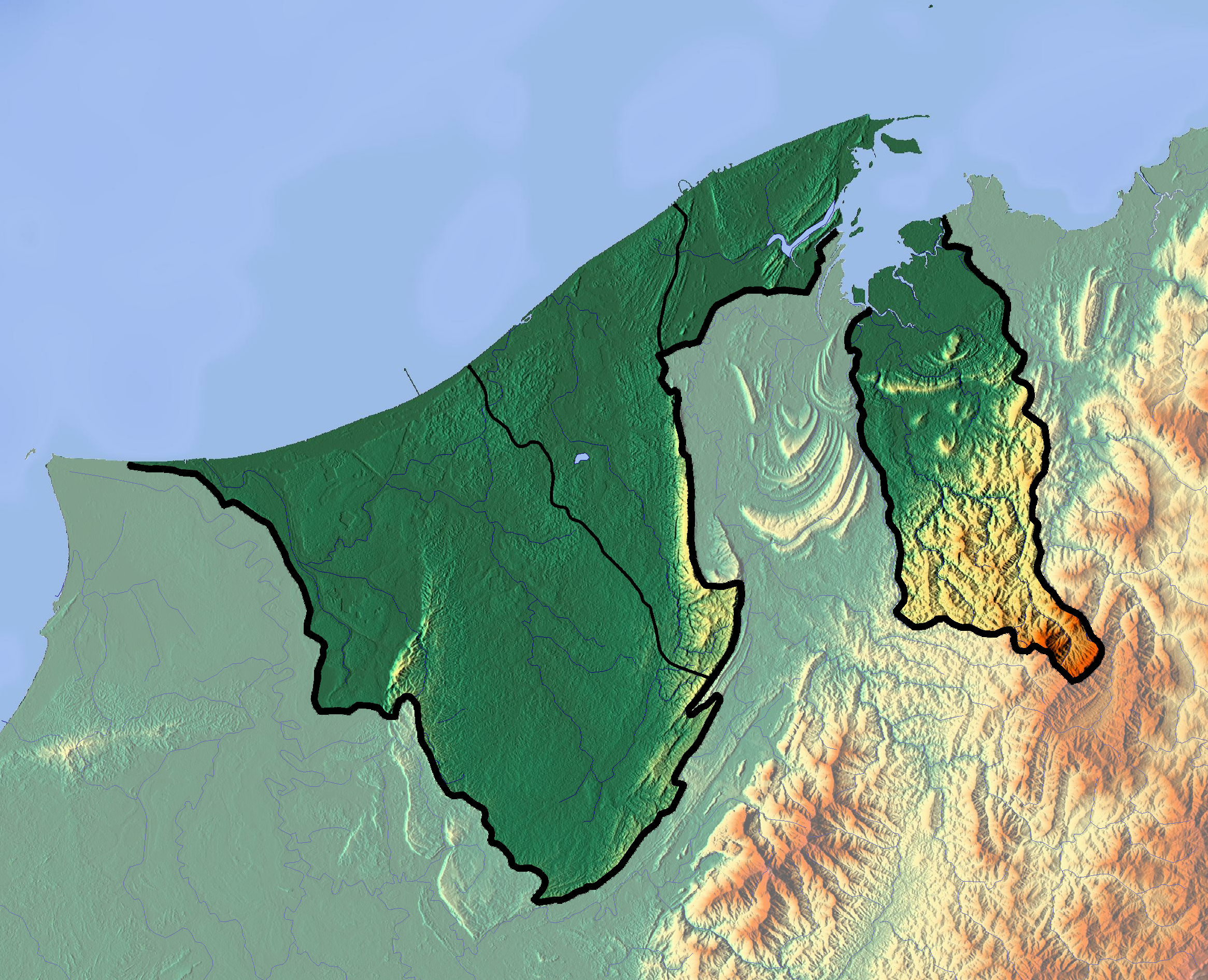
Brunei is divided into a larger western part and a smaller eastern part, the Temburong District, which is an exclave. The western part comprises the districts of Belait, Tutong, and Brunei-Muara. About 97% of the population resides in this western portion. The eastern Temburong District is more mountainous and sparsely populated, with only about 10,000 inhabitants.
The terrain of Brunei is primarily coastal plain in the north, rising to hilly lowlands and then mountainous areas in the interior, particularly in the Temburong District. The country's highest point is Bukit Pagon, at 6.1 K ft (1.85 K m), located in the Temburong District on the border with Malaysia. The western part of Brunei is generally flatter, especially along the coast, with extensive swampy areas. Major rivers include the Belait, Tutong, and Brunei rivers in the west, and the Temburong River in the east.
Brunei has a tropical rainforest climate, also known as an equatorial climate. This climate is characterized by high temperatures, high humidity, and heavy rainfall throughout the year. It is more influenced by the Intertropical Convergence Zone (ITCZ) than by trade winds, and cyclones are rare. The average annual temperature is around 80.6 °F (27 °C), with minimal variation. Daytime temperatures typically range from 75.2 °F (24 °C) to 89.6 °F (32 °C). Humidity is consistently high, often exceeding 80%.
Rainfall is abundant, with an annual average exceeding 0.1 K in (2.50 K mm) along the coast and potentially over 0.2 K in (4.00 K mm) in the interior mountainous regions. There is no distinct dry season, although rainfall tends to be heaviest during the northeast monsoon season (December to March) and slightly less intense, though still significant, during the southwest monsoon season (June to September).
4.2. Natural Environment and Ecosystem
Brunei is renowned for its well-preserved natural environment and rich biodiversity, largely due to its relatively low population density and government policies aimed at conservation.
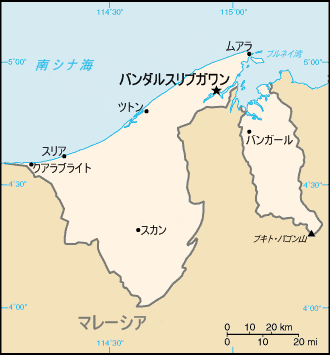
Approximately 72% of Brunei's total land area was covered by forest in 2020, equivalent to 939 K acre (380.00 K ha). This is a slight decrease from 1021 K acre (413.00 K ha) in 1990. In 2020, naturally regenerating forest covered 926 K acre (374.74 K ha), while planted forest covered 13 K acre (5.26 K ha). A significant portion, around 69%, of the naturally regenerating forest was reported to be primary forest, meaning native tree species with no clearly visible indications of human activity. About 5% of the forest area was found within protected areas. In 2015, 100% of the forest area was reported to be under public ownership. Most of Brunei falls within the Borneo lowland rain forests ecoregion, while Borneo montane rain forests are found in the inland, more elevated areas.
The country's forests are home to a vast array of flora and fauna, including many endemic and endangered species. Notable wildlife includes the proboscis monkey, Bornean orangutan (though rare in Brunei itself), various species of hornbills, clouded leopards, sun bears, and a rich diversity of insects, reptiles, and amphibians. Brunei's marine environment in the South China Sea also supports diverse coral reefs and marine life.
Brunei has established several national parks and protected areas to safeguard its natural heritage. The largest and most well-known is the Ulu Temburong National Park, covering approximately 124 K acre (50.00 K ha) in the Temburong District. It is a pristine rainforest area accessible primarily by boat and features a canopy walkway offering panoramic views of the forest. Other protected areas include forest reserves and wildlife sanctuaries.
Despite its strong conservation record, Brunei faces environmental challenges. These include the potential impacts of climate change, such as rising sea levels and increased frequency of extreme weather events, which could affect its coastal areas and ecosystems. Air and water pollution, though generally low compared to more industrialized nations, are localized concerns. The government has committed to sustainable development practices and participates in international environmental agreements. Efforts are focused on balancing economic development with environmental protection, including initiatives for renewable energy and sustainable forest management. Brunei is also exposed to risks stemming from climate change along with other ASEAN member states.
5. Politics
Brunei Darussalam is an absolute monarchy where the Sultan holds supreme executive, legislative, and judicial authority. The political system is deeply rooted in the national philosophy of Melayu Islam Beraja (MIB), or Malay Islamic Monarchy, which emphasizes Malay culture, Islamic values, and the monarchical system as the foundations of the state.
This section describes Brunei's government structure, the role of the Sultan, the MIB philosophy, and the status of political parties.
5.1. Government Structure
Brunei is governed as an absolute monarchy. The Sultan of Brunei is the head of state and head of government, and also holds the positions of Prime Minister, Minister of Finance, Minister of Defence, and Minister of Foreign Affairs. The current Sultan is Hassanal Bolkiah, who ascended to the throne in 1967.
The 1959 Constitution provides the framework for governance, but many of its provisions, particularly those relating to democratic institutions, have been suspended since the 1962 Brunei Revolt. Following the revolt, a state of emergency was declared, which has been renewed every two years, effectively allowing the Sultan to rule by decree.
- Executive Branch: The Sultan exercises full executive authority. He is assisted by a Council of Cabinet Ministers, all of whom are appointed by and responsible to him. Key advisory bodies include the Privy Council (advising on constitutional matters, royal pardons, and appointments), the Council of Succession (determining the succession to the throne), and the Religious Council (advising on Islamic matters).
- Legislative Branch: The Legislative Council (Majlis Mesyuarat NegaraMajlis Məsyuarat Nəgara (Legislative Council)Malay) serves as a consultative parliamentary body. It was suspended in 1984 upon independence and reconvened in 2004. Its members are all appointed by the Sultan and include government officials, prominent individuals, and district representatives. The Council has no independent legislative power and primarily serves to deliberate on government policies and budgets, offering advice to the Sultan. There have been no general elections since 1962.
- Judicial Branch: Brunei has a dual judicial system. The secular courts, based on English common law, handle most civil and criminal cases. The Supreme Court is the highest secular court, comprising the Court of Appeal and the High Court. In civil cases, there is a right of appeal to the Judicial Committee of the Privy Council in the United Kingdom. Alongside the secular courts, Sharia courts deal with personal status matters for Muslims, such as marriage and inheritance. Since 2014, Sharia criminal law has been implemented in phases, expanding the jurisdiction of Sharia courts to cover certain criminal offenses for Muslims and, in some cases, non-Muslims.
The implications of the state of emergency, in place since 1962, mean that the country has technically been under a form of martial law, granting the Sultan extensive powers to maintain public order and security.
5.2. Sultan
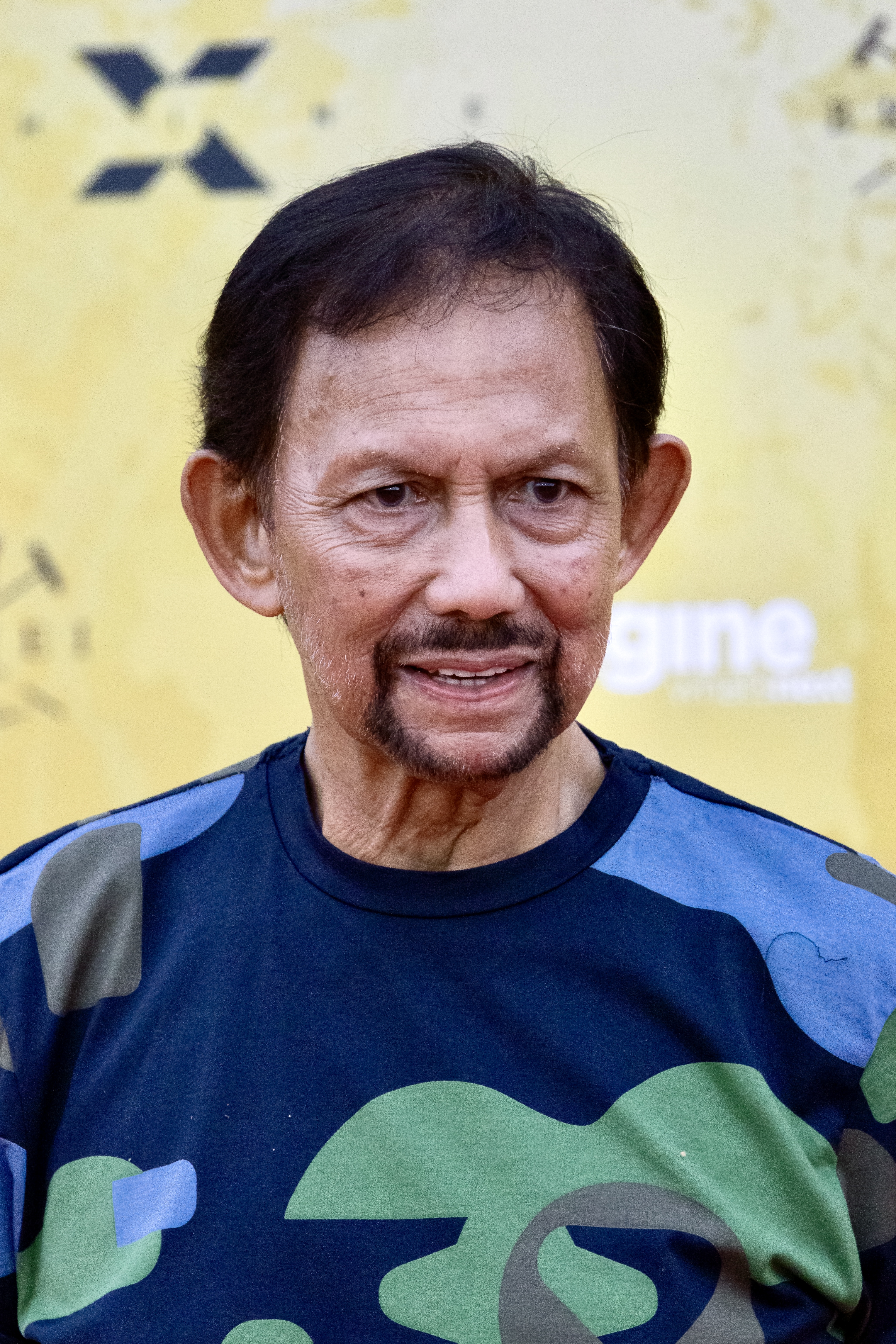
The current Sultan of Brunei is His Majesty Sultan Haji Hassanal Bolkiah Mu'izzaddin Waddaulah ibni Al-Marhum Sultan Haji Omar 'Ali Saifuddien Sa'adul Khairi Waddien. He ascended to the throne on October 5, 1967, following the abdication of his father, Sultan Omar Ali Saifuddien III. Hassanal Bolkiah is one of the world's longest-reigning monarchs.
Role and Powers:
As an absolute monarch, the Sultan holds supreme authority in Brunei. He is the Head of State, Head of Government (Prime Minister), Minister of Defence, Minister of Finance and Economy, and Minister of Foreign Affairs. He is also the head of Islam in Brunei. His powers are extensive and cover all aspects of governance, including the promulgation of laws by decree, appointment of all key government officials, control of the military and police, and oversight of the judiciary. The Sultan's decisions are final and not subject to review by other branches of government.
Succession:
The succession to the throne of Brunei is hereditary, typically passing to the eldest son of the reigning Sultan born of a royal wife. The Council of Succession advises the Sultan on matters related to succession. The current heir apparent is Crown Prince Al-Muhtadee Billah, the eldest son of Sultan Hassanal Bolkiah.
Life and Achievements:
Sultan Hassanal Bolkiah was born on July 15, 1946. He received his early education in Brunei and Malaysia, followed by military training at the Royal Military Academy Sandhurst in the United Kingdom. Under his reign, Brunei achieved full independence in 1984. He has overseen the country's development, largely funded by its oil and gas wealth, which has resulted in a high standard of living, free education and healthcare, and extensive social welfare programs for Bruneian citizens. He has also initiated Wawasan Brunei 2035 (Brunei Vision 2035), a long-term development plan aimed at diversifying the economy and enhancing the quality of life. The Sultan is known for his personal wealth and the opulence of the royal family, including the Istana Nurul Iman, one of the world's largest residential palaces.
Impact on Democracy, Human Rights, and Social Progress:
The Sultan's rule has been characterized by political stability and economic prosperity for many Bruneians. However, from a perspective focused on democracy and human rights, his reign presents a mixed picture.
- Democracy: Brunei remains an absolute monarchy with no elected national legislature and severe restrictions on political activity. Political parties have a minimal role, and there is no organized political opposition. The state of emergency, in place since 1962, curtails many civil liberties. Decisions are centralized within the monarchy, limiting public participation in governance.
- Human Rights: Concerns have been raised by international organizations regarding human rights in Brunei, particularly concerning freedom of speech, press, assembly, and religion. The media is largely state-controlled and self-censorship is common. The implementation of Sharia criminal law, including punishments such as caning, amputation, and stoning (though a moratorium on the death penalty is in place), has been widely criticized as a violation of international human rights standards. The rights of LGBT individuals are severely restricted, with homosexual acts criminalized.
- Social Progress: While Brunei has made significant strides in areas like education, healthcare, and poverty reduction due to its oil wealth, social progress in terms of openness and inclusivity has been more limited. The emphasis on MIB as the national ideology promotes a specific Malay-Islamic identity, which can marginalize minority groups. Women have access to education and employment but may face discrimination in certain areas and are subject to Sharia family law.
The royal family wields considerable social and economic influence in Brunei, with members holding key positions in government and business. The image of the monarchy is carefully managed, and open criticism is rare.
5.3. Melayu Islam Beraja (MIB)
Melayu Islam Beraja (MIB), which translates to Malay Islamic Monarchy, is the national philosophy and guiding ideology of Brunei Darussalam. It was officially proclaimed as the state philosophy upon Brunei's full independence in 1984, although its roots can be traced further back in the country's history and cultural development. MIB encapsulates the core values and principles that underpin Bruneian society, governance, and national identity.
The three components of MIB are:
- Melayu (Malay): This component emphasizes the importance of Malay culture, language (Bahasa MelayuBahasa Məlayu (Malay language)Malay), traditions, customs, and values as the foundation of Bruneian national identity. It promotes the preservation and perpetuation of Malay heritage, social etiquette, and a sense of community. The Malay language is the official language, and Malay customs are integrated into official ceremonies and daily life.
- Islam: This component underscores the central role of Islam as the official religion of Brunei and a way of life for its Muslim citizens, who form the majority of the population. It signifies the adherence to Islamic teachings, principles, and laws (Sharia) in both personal and public spheres. The Shafi'i school of Sunni Islam is predominant. Islamic institutions, religious education, and the observance of Islamic practices are strongly supported by the state.
- Beraja (Monarchy): This component affirms the system of monarchy, with the Sultan as the supreme head of state and the symbol of national unity and sovereignty. It emphasizes loyalty and respect for the Sultan and the royal institution, which has been a continuous feature of Brunei's history for centuries. The monarchy is seen as the protector of the Malay identity and Islam, and the guarantor of peace, stability, and prosperity in the nation.
Historical Background:
The concept of MIB evolved over time, drawing from Brunei's long history as a Malay Sultanate that embraced Islam centuries ago. While formally articulated in 1984, the elements of Malay identity, Islamic faith, and monarchical rule have long been intertwined in the socio-political fabric of Brunei. The proclamation of MIB as the national philosophy was intended to reinforce these traditional pillars in the face of modernization and globalization, providing a unique framework for national development.
Influence on Society:
MIB has a pervasive influence on all aspects of Bruneian society:
- Governance and Politics: It serves as the ideological basis for the absolute monarchy and the political system. Government policies and laws are expected to align with MIB principles.
- Education: The MIB philosophy is integrated into the national education curriculum at all levels to inculcate its values in the younger generation.
- Culture and Media: Cultural expressions and media content are often guided by MIB, promoting Malay traditions and Islamic values while discouraging content deemed contrary to these principles.
- Social Norms: MIB shapes social etiquette, public behavior, and community interactions, reinforcing conservative Islamic and Malay values.
- Legal System: The implementation of Sharia law is a direct manifestation of the Islamic component of MIB.
MIB is intended to foster national unity, social harmony, and stability by grounding the nation in its historical and cultural heritage. However, from a critical perspective, its emphasis on a specific ethnic and religious identity has raised concerns about the inclusivity and rights of minority groups and the limitations it may place on freedom of expression and alternative lifestyles.
5.4. Political Parties
Political parties in Brunei have a very limited role and operate under significant restrictions. The country's political landscape is dominated by the absolute monarchy, and there have been no national elections since 1962.
The Brunei People's Party (Parti Rakyat Brunei - PRB) was a significant political force in the early 1960s. It advocated for full independence from Britain, a constitutional monarchy with a democratic government, and the formation of a North Borneo Federation with Sarawak and North Borneo (Sabah). The PRB won all elected seats in the 1962 Legislative Council election. However, its subsequent demands and the outbreak of the Brunei Revolt in December 1962, led by its military wing, resulted in the party being banned and its leaders arrested or exiled.
Since the 1962 revolt and the subsequent declaration of a state of emergency (which remains in effect), political party activity has been severely curtailed. A few small political parties have been allowed to register, but their activities are heavily restricted, and they do not play a meaningful role in the country's governance. These parties include:
- Brunei National Solidarity Party (Parti Perpaduan Kebangsaan Brunei - PPKB)
- People's Awareness Party (Parti Kesedaran Rakyat - PAKAR)
- Brunei National Democratic Party (Parti Pembangunan Bangsa Brunei - PNDP) (officially de-registered but some sources may still list it).
These parties have limited membership and visibility. They are not permitted to contest national elections, as such elections are not held. Their ability to organize, hold public meetings, or criticize government policy is extremely limited. The Societies Order and the Internal Security Act provide the government with broad powers to regulate and restrict political organizations. Many civil servants, who form a large portion of the workforce, are also prohibited from joining political parties.
Effectively, Brunei operates as a de facto single-party state, or more accurately, a no-party state in terms of national governance, with all political power concentrated in the hands of the Sultan and the monarchy. The government maintains that formal political parties are unnecessary as citizens can voice concerns or seek assistance through traditional channels, such as village heads or by directly petitioning government officials or the Sultan. This system, however, significantly limits political pluralism and democratic participation from a critical, social liberalism perspective.
6. Administrative Divisions
Brunei Darussalam is divided into four main administrative divisions known as districts (DaerahDaerah (District)Malay). Each district is further subdivided into mukims (sub-districts), and mukims are composed of villages (KampungKampung (Village)Malay or KampongKampong (Village)Malay). The administration of these units falls under the Ministry of Home Affairs.
The four districts are:
1. Brunei-Muara: This is the most populous and smallest district by land area. It is home to the capital city, Bandar Seri Begawan. It serves as the country's administrative, commercial, and financial center.
2. Belait: Located in the westernmost part of the country, Belait is the largest district by area. It is the heart of Brunei's oil and gas industry, with major towns like Kuala Belait (the district capital) and Seria (the oil town).
3. Tutong: Situated between Brunei-Muara and Belait districts, Tutong is characterized by its diverse ethnic groups and natural attractions, including Tasek Merimbun, Brunei's largest natural lake. The district capital is Pekan Tutong.
4. Temburong: This is an exclave, geographically separated from the rest of Brunei by the Malaysian state of Sarawak and the Brunei Bay. It is predominantly covered by pristine rainforest and is home to the Ulu Temburong National Park. The district capital is Bangar. The Temburong Bridge, opened in 2020, now connects Temburong to the Brunei-Muara district by road.
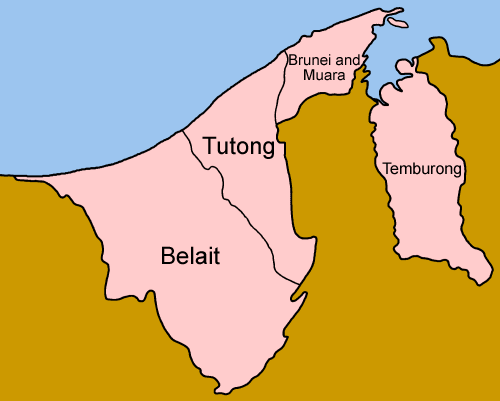
Each district is headed by a District Officer (Pegawai DaerahPəgawaj Daerah (District Officer)Malay), appointed by the government. The District Office is responsible for local administration, development, and community welfare within the district.
Mukims are the next level of administrative division below districts. There are 39 mukims in total across the four districts. Each mukim is headed by a Penghulu (Mukim Head), who is also a government appointee. Mukims serve as an intermediary administrative level, overseeing a collection of villages.
Villages (Kampung) are the smallest administrative units. Each village is led by a Ketua Kampung (Village Head). Village heads are responsible for the welfare of their communities, organizing local activities, and liaising with higher levels of government. Some urban areas and towns are administered as Municipal Board areas (kawasan Lembaga Bandarankawasan Ləmbaga Bandaran (Municipal Board area)Malay), governed by Municipal Departments (Jabatan BandaranJabatan Bandaran (Municipal Department)Malay), which may encompass several villages or mukims.
6.1. Major Cities
While Brunei has several urban centers, its population is relatively small, and the distinction between "city" and "town" can be fluid. The primary urban centers are:
- Bandar Seri Begawan (BSB):
- Location: Situated in the Brunei-Muara District, on the northern bank of the Brunei River.
- Population: Approximately 100,700 people in the municipal area (estimates vary, with the greater metropolitan area being larger, around 279,924 in the Brunei-Muara district as of 2011).
- Economic Functions: As the capital city, BSB is the administrative, financial, commercial, and cultural heart of Brunei. It hosts government ministries, major banks, corporate headquarters, and retail centers.
- Cultural Features: BSB is known for its impressive Islamic architecture, including the Sultan Omar Ali Saifuddien Mosque and the Jame'Asr Hassanil Bolkiah Mosque. Other landmarks include the Istana Nurul Iman (the Sultan's official residence), the Royal Regalia Museum, and Kampong Ayer (the historic water village). It reflects the nation's MIB philosophy.
- Kuala Belait (KB):
- Location: Situated in the Belait District, near the mouth of the Belait River on the coast of the South China Sea, close to the Malaysian border.
- Population: Approximately 31,178 (as of 2016 town estimate).
- Economic Functions: Kuala Belait is the administrative center of the Belait District and a key hub for the oil and gas industry. Many oil and gas companies, including Brunei Shell Petroleum, have offices and operations in or near KB. It also serves as a commercial center for the western part of Brunei.
- Cultural Features: KB has a more industrial feel due to its economic base but also features recreational facilities, parks, and a notable landmark, the Tea Pot Roundabout (Belait District Monument). It has a significant expatriate community working in the oil and gas sector.
- Seria:
- Location: Located in the Belait District, a short distance east of Kuala Belait, also on the coast.
- Population: Approximately 30,097 (as of 2016 town estimate).
- Economic Functions: Seria is often referred to as the "oil town" of Brunei, as it was where oil was first discovered in 1929. It remains the center of Brunei's onshore oil production. Brunei Shell Petroleum's headquarters and main operations are based here. The town's economy is almost entirely dependent on the oil and gas industry.
- Cultural Features: Seria is characterized by oil industry infrastructure, including nodding donkeys (oil pumps). The Billionth Barrel Monument commemorates the production of the billionth barrel of oil from the Seria field. Like Kuala Belait, it has a substantial expatriate population. Recreational facilities catering to this community, such as the Panaga Club, are prominent.
Other notable towns include Muara, the country's main port town, and Pekan Tutong, the administrative center of the Tutong District, and Bangar, the administrative center of Temburong District.
7. Foreign Relations
Brunei Darussalam pursues a foreign policy based on mutual respect for territorial sovereignty, integrity, and independence, the maintenance of friendly relations, non-interference in internal affairs, and the promotion of peace, security, and stability in the region. Until 1979, its foreign relations were managed by the UK government. After gaining full independence in 1984, the Brunei Diplomatic Service was upgraded to the ministerial level, now known as the Ministry of Foreign Affairs.
This section covers Brunei's key bilateral relationships, its engagement with South Korea, activities in international organizations, and territorial disputes.
7.1. Major Bilateral Relations
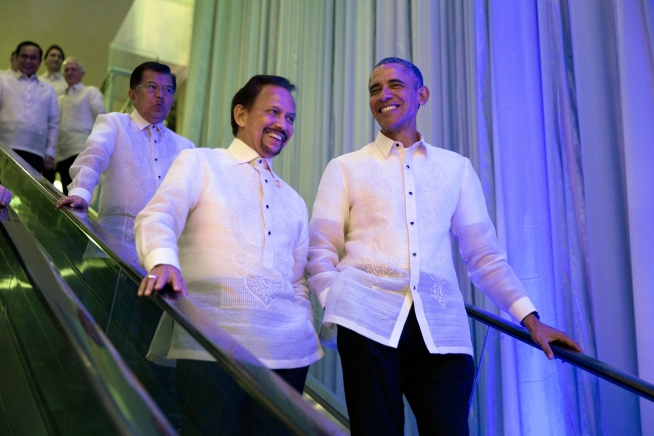
Brunei maintains diplomatic relations with numerous countries worldwide, prioritizing relationships with its neighbors and key partners.
- United Kingdom: Brunei has long-standing historical ties with the UK, having been a British protectorate until 1984. The relationship remains strong, particularly in defense, education, and trade. A Gurkha battalion from the British Army is stationed in Brunei under a defense agreement, and the Sultan himself is a Sandhurst alumnus. Many Bruneians study in the UK.
- Singapore: Brunei and Singapore share a uniquely close and special relationship, often described as a "strategic partnership." This is underpinned by strong defense cooperation, including joint military exercises and training facilities for the Singapore Armed Forces in Brunei. The two countries also have a Currency Interchangeability Agreement, where the Brunei dollar and Singapore dollar are accepted at par in both countries. They collaborate closely within ASEAN and on other international forums.
- Malaysia: As immediate neighbors sharing the island of Borneo, Brunei and Malaysia have a complex but generally amicable relationship. They cooperate on various fronts, including trade, security, and socio-cultural exchanges. However, unresolved territorial issues, notably the Limbang dispute and maritime claims, occasionally surface. The opening of the Temburong Bridge has improved connectivity but also highlights the geographical intricacies.
- Indonesia: Brunei shares cultural and religious ties with Indonesia, the world's most populous Muslim-majority country. Relations are friendly, with cooperation in areas such as education, labor (many Indonesians work in Brunei), and within ASEAN.
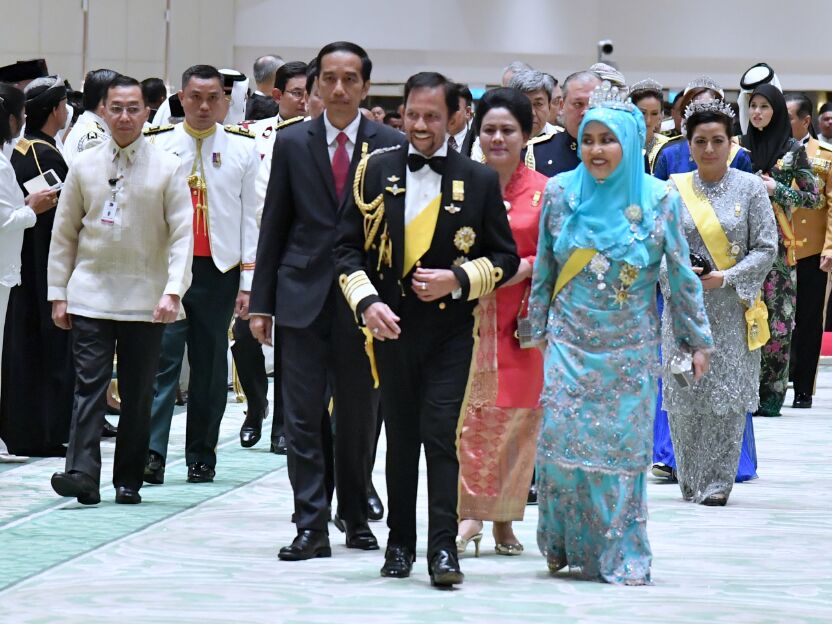
- Other Key Partners: Brunei also maintains important relationships with other ASEAN member states, countries in the Middle East (particularly through the OIC), China, Japan, South Korea, Australia, and the United States. These relationships often focus on economic cooperation (especially energy trade and investment), security, and educational exchange.
7.1.1. Relations with South Korea
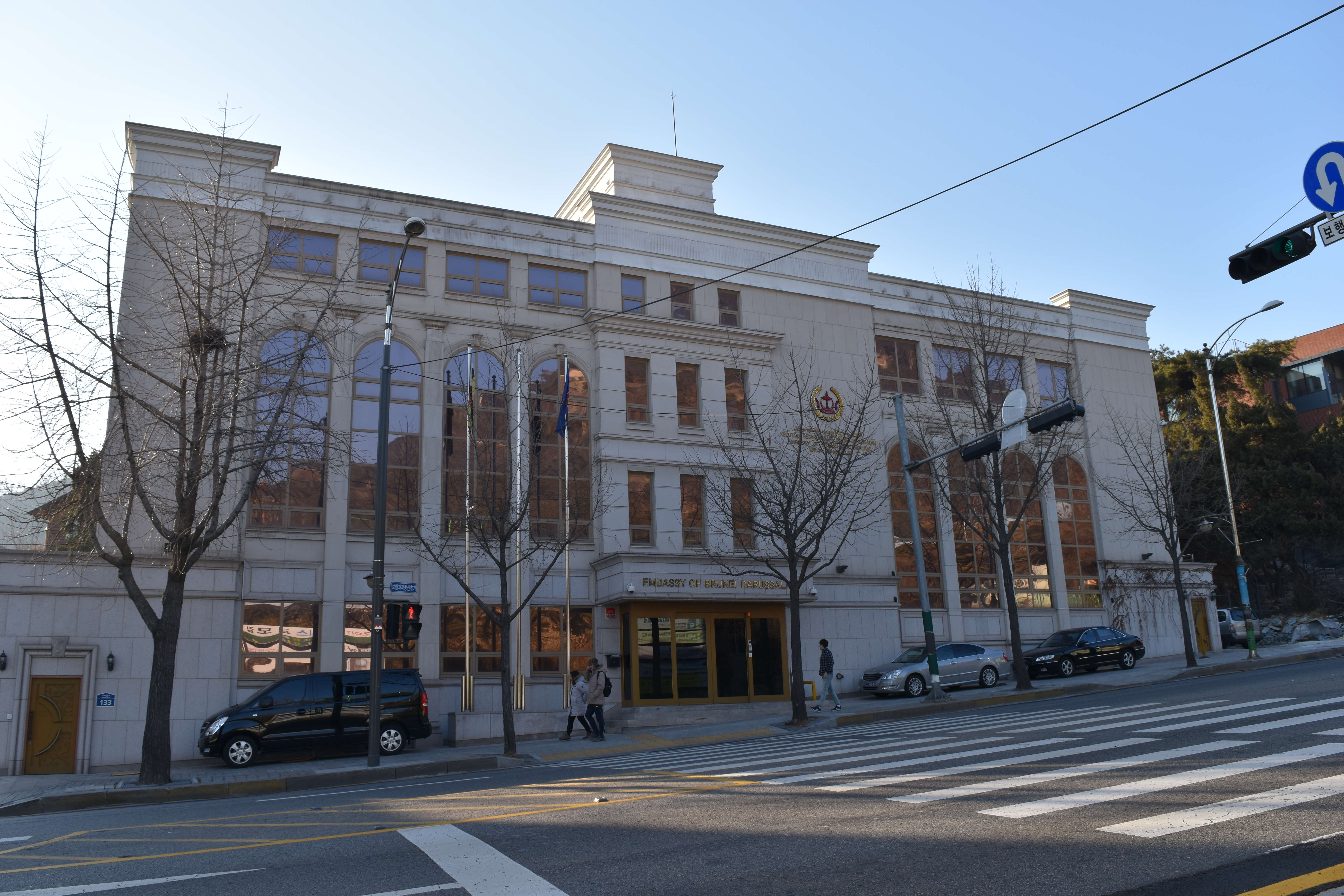
Brunei Darussalam and the Republic of Korea (South Korea) established diplomatic relations on June 1, 1984, shortly after Brunei achieved full independence. Since then, the two countries have maintained friendly and cooperative ties, primarily focused on economic and energy sectors, with growing cultural and people-to-people exchanges.
Economic Cooperation:
Energy has been a cornerstone of bilateral economic relations. South Korea is a significant importer of Brunei's Liquefied Natural Gas (LNG) and crude oil. Bruneian LNG has played a role in South Korea's energy security for many years. South Korean companies have also been involved in Brunei's construction and infrastructure development projects. There is ongoing interest in expanding cooperation into new areas such as renewable energy, ICT, tourism, and Halal industries, aligning with Brunei's Wawasan 2035 diversification goals.
Cultural Exchange and People-to-People Ties:
Cultural exchange activities have increased over the years, fostering greater understanding between the two nations. This includes educational exchanges, youth programs, and the growing popularity of South Korean pop culture (the "Korean Wave" or Hallyu) in Brunei. Tourism from South Korea to Brunei has also seen some growth, attracted by Brunei's natural environment and Islamic culture. An increasing number of Bruneian students are also choosing South Korea for higher education.
High-Level Visits and Bilateral Issues:
There have been several high-level visits between officials of both countries, reinforcing bilateral ties. Cooperation extends to regional and international forums where both countries are members, such as ASEAN (South Korea is a dialogue partner), APEC, and the UN. There are no major bilateral disputes or significant contentious issues between Brunei and South Korea. The relationship is generally characterized by mutual respect and a shared interest in promoting peace and prosperity in the East Asian region. The South Korean embassy in Bandar Seri Begawan and the Bruneian embassy in Seoul facilitate these interactions.
7.2. International Organization Activities
Brunei is an active participant in various international and regional organizations, through which it promotes its national interests, contributes to global and regional governance, and engages in multilateral diplomacy.
- Association of Southeast Asian Nations (ASEAN): Brunei became the sixth member of ASEAN on January 7, 1984, just after its independence. ASEAN is a cornerstone of Brunei's foreign policy. Brunei actively participates in all ASEAN mechanisms and has chaired the organization multiple times, most recently in 2021. It supports ASEAN's goals of regional integration, peace, and stability.
- United Nations (UN): Brunei joined the UN on September 21, 1984. It participates in UN General Assembly sessions and contributes to various UN agencies and programs, focusing on issues relevant to small states, development, and international peace and security.
- Organisation of Islamic Cooperation (OIC): As an Islamic Sultanate, Brunei became a full member of the OIC in January 1984. It participates in OIC summits and meetings, working with other Muslim-majority countries on issues of common concern, including economic cooperation, cultural exchange, and solidarity with the Muslim world.
- Commonwealth of Nations: Brunei joined the Commonwealth on January 1, 1984. It values its membership as a link to other former British colonies and participates in Commonwealth Heads of Government Meetings (CHOGM) and various Commonwealth initiatives related to democracy, development, and youth.
- Asia-Pacific Economic Cooperation (APEC): Brunei joined APEC in 1989. It hosted the APEC Economic Leaders' Meeting in 2000. Brunei participates in APEC's efforts to promote free trade and economic cooperation in the Asia-Pacific region.
- Other Organizations: Brunei is also a member of the Non-Aligned Movement (NAM), the World Trade Organization (WTO), and participates in sub-regional cooperation initiatives like the Brunei-Indonesia-Malaysia-Philippines East ASEAN Growth Area (BIMP-EAGA).
Through these memberships, Brunei seeks to enhance its diplomatic reach, secure its economic interests, and contribute to regional and international stability, despite its small size.
7.3. Territorial Disputes
Brunei Darussalam is involved in a few territorial disputes, primarily concerning maritime claims in the South China Sea and a historical land border issue with Malaysia.
- Spratly Islands in the South China Sea: Brunei is one of several claimants to parts of the Spratly Islands, a strategically important and potentially resource-rich archipelago. Brunei's claim is relatively modest compared to other claimants like China, Vietnam, the Philippines, Malaysia, and Taiwan. Brunei claims Louisa Reef (Terumbu Semarang Barat KecilTərumbu Səmaraŋ Barat Kətʃil (Louisa Reef)Malay), which lies within its Exclusive Economic Zone (EEZ). Brunei has generally adopted a quiet diplomatic approach to this dispute, emphasizing peaceful resolution in accordance with international law, particularly the United Nations Convention on the Law of the Sea (UNCLOS). It supports ASEAN's efforts to establish a Code of Conduct (COC) in the South China Sea. From the perspective of de facto control, Brunei maintains a presence or exercises jurisdiction over areas within its EEZ claims. Other nations, notably China with its expansive "nine-dash line" claim, also assert sovereignty over areas overlapping Brunei's claim, leading to diplomatic complexities.
- Limbang Border Issue with Malaysia: This is a historical dispute concerning the district of Limbang in Sarawak, Malaysia. Limbang geographically divides Brunei into two parts. Brunei has historically not recognized Sarawak's annexation of Limbang in 1890 by the Brooke Raj. While there were reports in 2009 suggesting that Brunei had dropped its claim to Limbang in exchange for Malaysia dropping claims to oil fields in Bruneian waters, the Bruneian government later denied this, stating that its claim on Limbang was never dropped. The issue remains a sensitive point in bilateral relations, though both countries generally manage it through diplomatic channels to avoid escalation. Brunei's official stance maintains its historical claim, while Malaysia exercises de facto administrative control over Limbang as part of Sarawak. The impact on local populations, particularly those living near the border or relying on cross-border movement, can be a concern, though daily life and border crossings generally proceed under existing arrangements.
Brunei's approach to territorial disputes generally emphasizes diplomacy, adherence to international law, and the importance of regional stability. While asserting its sovereign rights, it seeks to manage these disputes peacefully to maintain good relations with its neighbors and within ASEAN.
8. Military
Brunei Darussalam maintains a small but well-equipped military force, the Royal Brunei Armed Forces (RBAF; Angkatan Bersenjata Diraja BruneiAŋkatan Bərsəndʒatə Diradʒə Brunaj (Royal Brunei Armed Forces)Malay), primarily focused on national defense, internal security, and contributing to regional stability. Its defense policy emphasizes deterrence, diplomacy, and cooperation with friendly nations.
This section details the RBAF's organization and armament, as well as the presence of foreign military forces in the country.
8.1. Armament and Organization
The Royal Brunei Armed Forces (RBAF) consists of three main branches:
- Royal Brunei Land Forces (Tentera Darat Diraja BruneiTəntəra Darat Diradʒə Brunaj (Royal Brunei Land Forces)Malay - RBLF): This is the largest component of the RBAF, comprising three infantry battalions and support units. Their primary role is land-based defense and internal security. Equipment includes armored personnel carriers, light artillery, anti-tank weapons, and standard infantry small arms (e.g., M16 rifles).
- Royal Brunei Navy (Tentera Laut Diraja BruneiTəntəra Laut Diradʒə Brunaj (Royal Brunei Navy)Malay - RBN): The navy is responsible for maritime security, protecting Brunei's coastline, territorial waters, and offshore oil and gas installations. Its fleet includes offshore patrol vessels (OPVs), such as the Darussalam-class and Ijtihad-class, fast patrol boats, and support craft.
- Royal Brunei Air Force (Tentera Udara Diraja BruneiTəntəra Udara Diradʒə Brunaj (Royal Brunei Air Force)Malay - RBAirF): The air force provides air defense, surveillance, troop transport, and support for ground and naval operations. Its inventory includes S-70i Black Hawk helicopters, Bell 212 utility helicopters, CN-235 transport aircraft, and Pilatus PC-7 trainer aircraft. Brunei has also expressed interest in acquiring more advanced combat capabilities.
The RBAF is an all-volunteer force, with recruitment open only to Malay citizens of Brunei. Its total active strength is around 7,000 personnel, with a small reserve force. The defense budget for the 2016-17 fiscal year was approximately 564.00 M BND (around 408.00 M USD at the time), representing a significant portion of the national expenditure and GDP. The military acquires equipment primarily from Western countries, including the United Kingdom, France, and the United States. Training and joint exercises are often conducted with these and other partner nations, particularly Singapore and Malaysia.
The Supreme Commander of the RBAF is the Sultan of Brunei.
8.2. Stationed Foreign Forces

A significant foreign military presence in Brunei is the British Army's Gurkha unit. A battalion of the Brigade of Gurkhas (currently the 2nd Battalion, Royal Gurkha Rifles) has been stationed in Seria, the center of Brunei's oil industry, since the 1960s. This presence stems from a defense agreement between Brunei and the United Kingdom.
Role and Size: The Gurkha battalion, typically numbering around 1,000 to 1,500 personnel, is primarily responsible for protecting British interests, including oil and gas installations, and providing a rapid deployment capability in the region if needed. They also contribute to Brunei's defense and security through their presence and by conducting joint training exercises with the RBAF. The British government covers the costs of maintaining this garrison, though Brunei provides some facilities.
Background and Impact: The Gurkhas have a long history of service with the British Army. Their presence in Brunei is a legacy of the colonial era and the close defense ties that have continued post-independence. The garrison is seen as a contribution to regional stability and a symbol of the strong bilateral relationship between Brunei and the UK. It also provides a training environment for British forces in a tropical setting. For Brunei, the Gurkha presence enhances its national defense capabilities and acts as a deterrent.
In July 2012, a Bell 212 helicopter operated by the Royal Brunei Air Force crashed in Kuala Belait, resulting in the loss of 12 of the 14 crew members on board. This was the worst aviation incident in Brunei's history.
9. Law and Human Rights
Brunei Darussalam's legal system is a dual one, incorporating elements of English common law and Islamic Sharia law. The human rights situation in Brunei has drawn international attention, particularly following the full implementation of the Sharia Penal Code. This section examines the judicial system, the implementation of Sharia law, and the status of rights for women, children, LGBT individuals, religious freedom, and animal welfare, reflecting a center-left/social liberalism perspective that emphasizes the impact on human rights and social progress.
9.1. Judicial System
Brunei's judicial system operates on two parallel tracks:
- Common Law Courts: Based on the English common law tradition inherited from the British protectorate period, these courts handle most civil and criminal matters. The hierarchy includes Magistrates' Courts, Intermediate Courts, and the Supreme Court, which consists of the High Court and the Court of Appeal. For civil cases, a final appeal can be made to the Judicial Committee of the Privy Council in London. Judges in the secular courts are appointed by the Sultan.
- Sharia Courts: These courts deal with matters of Islamic personal law for Muslims, such as marriage, divorce, inheritance, and custody. With the phased implementation of the Sharia Penal Code Order (SPCO) starting in 2014 and fully enacted by 2019, the jurisdiction of Sharia courts has expanded to include criminal offenses.
This dual system means that individuals, particularly Muslims, can be subject to different sets of laws and judicial processes depending on the nature of the case.
9.2. Sharia Law Implementation
In October 2013, Sultan Hassanal Bolkiah announced the intention to implement a new Sharia Penal Code Order (SPCO). The SPCO was introduced in three phases:
- Phase 1 (April 2014): Covered offenses punishable by fines or imprisonment (e.g., disrespect for Ramadan, failure to attend Friday prayers).
- Phase 2 (2019): Introduced corporal punishments like whipping (hudud) for offenses such as theft and alcohol consumption by Muslims.
- Phase 3 (2019): Implemented the most severe punishments, including amputation for theft (sariqah), and stoning to death for offenses like adultery (zina), sodomy (liwat), and blasphemy.
Main Provisions and Current Status:
The SPCO applies primarily to Muslims, but some provisions can also apply to non-Muslims, particularly if they are involved in an offense with a Muslim or if the offense is deemed to undermine Islamic values. Key provisions that have caused concern include:
- Punishments such as caning, amputation, and stoning.
- Criminalization of homosexual acts between men (punishable by death by stoning or whipping) and between women (punishable by caning or imprisonment).
- Strict penalties for adultery, out-of-wedlock births, and "indecent behavior."
- Restrictions on religious freedom, including making it an offense for Muslims to renounce Islam or for non-Muslims to proselytize to Muslims.
International Community's Reactions and Concerns:
The implementation of the SPCO sparked widespread international condemnation from governments, the United Nations, human rights organizations (like Amnesty International and Human Rights Watch), and public figures. Concerns centered on:
- The severity and inhumanity of the prescribed punishments, which are considered torture or cruel, inhuman, or degrading treatment under international law.
- Discrimination against women, LGBT individuals, and religious minorities.
- Contradictions with Brunei's obligations under international human rights treaties.
- The potential for a chilling effect on freedom of expression and personal autonomy.
In response to the international outcry in 2019, Sultan Hassanal Bolkiah announced a de facto moratorium on the death penalty under the SPCO, extending an existing moratorium on capital punishment under the civil penal code. However, the SPCO remains law, and other punishments like caning continue to be implemented. The UN High Commissioner for Human Rights stated that the application of the death penalty for such a broad range of offenses contravenes international law. The overall human rights environment has deteriorated, with increased fear and self-censorship among the population. The law's impact on foreign investment and Brunei's international reputation has also been a subject of discussion.
9.3. Women's and Children's Rights
Women's Rights:
Legally, women in Brunei have access to education (often outperforming men academically) and participate in the workforce, including in government and professional roles. However, their status is also shaped by Islamic family law and societal norms influenced by MIB.
- In marriage and family law, women's rights regarding divorce, inheritance, and child custody are governed by Sharia law, which can differ from secular legal principles and may not always provide equal rights compared to men.
- While the law prohibits sexual harassment, marital rape is not explicitly criminalized in the civil code, though protections against spousal sexual assault are provided under the amended Islamic Family Law Order 2010 and Married Women Act Order 2010. The penalty for breaching a protection order is a fine or imprisonment.
- Discrimination against women in some areas of employment or public life may occur. Women are required to wear the tudongtudung (headscarf)Malay (headscarf) in government offices and educational institutions.
- The SPCO contains provisions that disproportionately affect women, such as those related to adultery or out-of-wedlock pregnancies, and standards of evidence in Sharia courts can sometimes be disadvantageous to women.
Children's Rights:
Brunei has laws to protect children from abuse and exploitation. The law stipulates imprisonment and caning for rape, with specific provisions protecting girls under 14. The intent is to protect girls from exploitation through prostitution and "other immoral purposes," including pornography. Compulsory education is in place.
- Bruneian citizenship is primarily derived through the father's nationality. Children born to Bruneian mothers and foreign fathers may face difficulties acquiring citizenship. Parents with stateless status must apply for a special pass for a child born in the country, and failure to register a child can impede access to education and other services.
- Concerns exist regarding the impact of the SPCO on children, particularly the application of caning for juvenile offenders and the age of criminal responsibility.
- Child marriage is a concern, as Islamic law permits marriage for girls below the age of 18 under certain conditions.
From a social liberalism perspective, while basic protections exist, full equality and autonomy for women, and comprehensive protection of children's rights in line with international standards (like the Convention on the Rights of the Child, which Brunei has ratified) require ongoing scrutiny and improvement, especially in light of the SPCO.
9.4. LGBT Rights
The human rights situation for LGBT (lesbian, gay, bisexual, and transgender) individuals in Brunei is severe and has significantly worsened with the full implementation of the Sharia Penal Code Order (SPCO) in 2019.
- Legal Provisions:
- Under the pre-existing civil penal code, homosexual acts were already illegal.
- The SPCO criminalizes consensual same-sex sexual activity with extreme penalties. For men, liwat (sodomy) is punishable by death by stoning or whipping. For women, musahaqah (lesbian acts) are punishable by caning or imprisonment.
- Cross-dressing and other forms of gender expression that do not conform to traditional norms are also restricted.
- Human Rights Situation and Social Perceptions:
- The laws create a climate of fear and repression for LGBT individuals, forcing many to hide their identity. There are no legal protections against discrimination based on sexual orientation or gender identity.
- Public discussion of LGBT issues is highly restricted, and there are no LGBT advocacy organizations operating openly in the country.
- Social perceptions are generally conservative and influenced by Islamic teachings that condemn homosexuality. LGBT individuals face significant social stigma, discrimination, and the risk of prosecution.
- While the Sultan announced a moratorium on the death penalty under the SPCO in May 2019 following international outcry, the underlying laws criminalizing homosexual acts remain in place, along with other severe punishments like caning.
The legal framework and social environment in Brunei are highly repressive for LGBT people, representing a serious violation of fundamental human rights from a center-left/social liberalism perspective, which emphasizes equality, non-discrimination, and personal autonomy.
9.5. Freedom of Religion
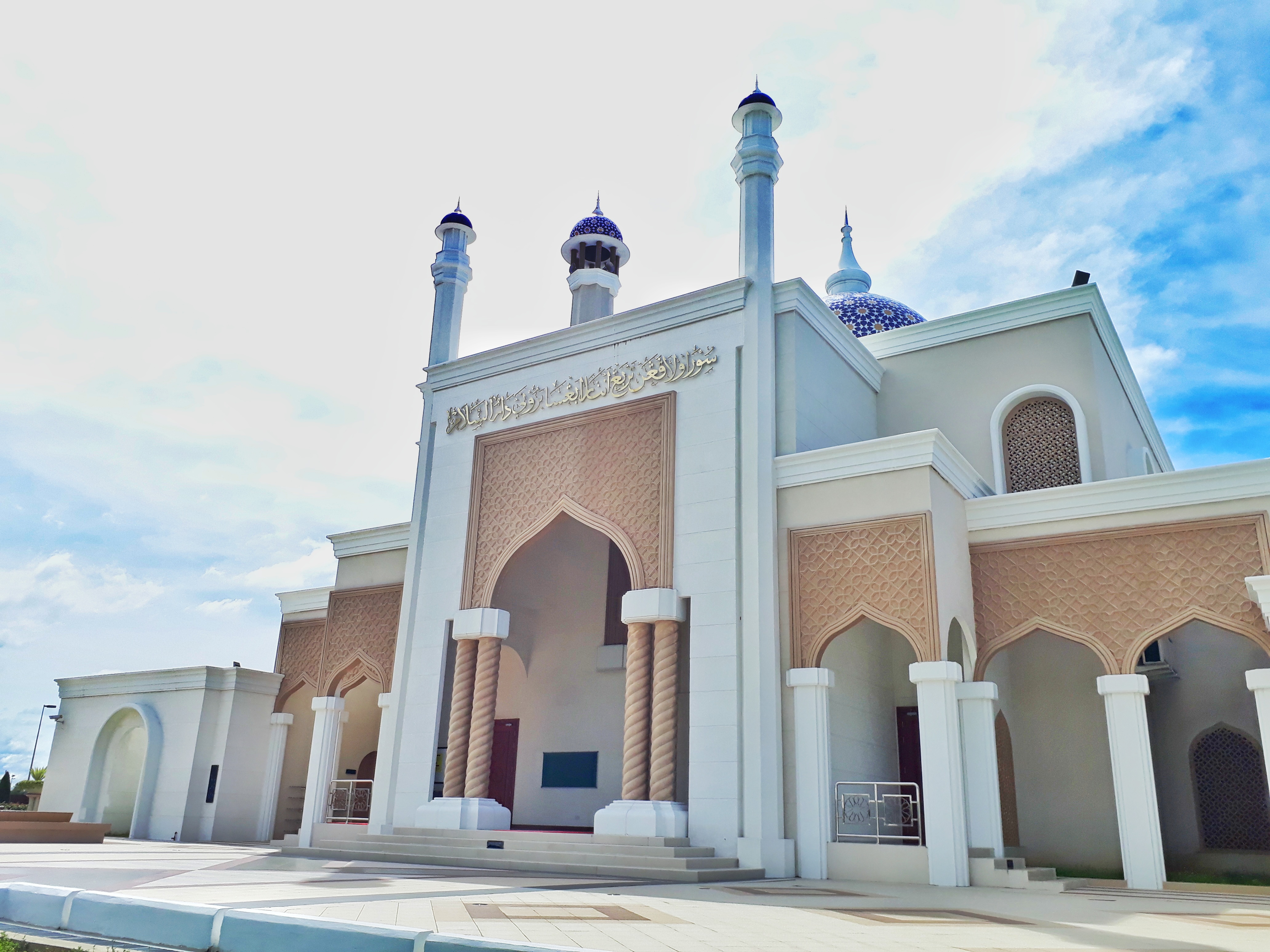
Islam is the official religion of Brunei, as enshrined in the constitution and the national philosophy of Melayu Islam Beraja. While the 1959 Constitution guarantees the right of non-Muslims to practice their faith, this freedom is subject to significant restrictions, particularly for religions other than Islam, such as Christianity and Buddhism.
- Legal Guarantees and Restrictions:
- Non-Muslims are allowed to practice their religion, but proselytizing to Muslims is strictly prohibited and punishable under the Sharia Penal Code Order (SPCO).
- The construction of new non-Muslim places of worship is heavily restricted, and existing ones often face difficulties with repairs or expansion.
- Public religious expression by non-Muslims is limited. Celebrations and prayers must generally be confined to places of worship and private residences. For example, public displays of Christmas decorations were banned by the Ministry of Religious Affairs, though celebrations within church compounds and private homes were permitted.
- Conversion:
- Muslims are forbidden from converting to another religion (apostasy), which is a criminal offense under the SPCO, potentially punishable by death (though a moratorium on the death penalty is in place).
- Non-Muslims wishing to marry Muslims are generally required to convert to Islam.
- Status of Non-Muslim Religions:
- Christian communities (various denominations, including Catholic and Protestant) and Buddhist communities (primarily among the Chinese population) exist in Brunei. They maintain places of worship and conduct services, but often under close scrutiny.
- The importation of non-Islamic religious materials, such as Bibles, may be restricted or require permits.
- Religious education in schools focuses on Islam, and non-Muslim students may have limited options for religious instruction in their own faith within the public school system.
The overall environment for religious freedom in Brunei is restrictive, especially for minority religions. The state actively promotes Islam and the MIB ideology, and laws and policies tend to favor the state religion. From a human rights perspective, these restrictions limit the full enjoyment of freedom of religion and belief for non-Muslims and for Muslims who may wish to change or question their faith.
9.6. Animal Rights
Brunei has taken some positive steps regarding animal protection and conservation, reflecting a growing awareness of these issues.
- Ban on Shark Finning: Brunei was reportedly the first country in Asia to implement a nationwide ban on shark finning. This measure is aimed at protecting shark populations, which are threatened globally due to the demand for shark fins.
- Protection of Endangered Species: The country has laws and policies to protect endangered species. For example, there are public campaigns and efforts to protect pangolins, which are native to Borneo and highly threatened by illegal wildlife trade. Brunei's extensive forest cover, much of which is well-preserved primary rainforest, provides crucial habitat for many endangered species.
- Forest Conservation: Brunei has maintained a high percentage of its forest cover compared to its neighbors on the island of Borneo. This commitment to forest conservation, including the establishment of national parks like Ulu Temburong, indirectly supports animal welfare by preserving habitats.
- General Animal Welfare Policies: While specific animal welfare laws covering domestic animals or livestock may not be as prominent in international discussions as wildlife conservation efforts, the general legal framework is expected to include provisions against animal cruelty.
From a conservation standpoint, Brunei's efforts, particularly in banning shark finning and protecting its forests, are commendable. However, ongoing vigilance is needed to combat poaching and illegal wildlife trade, which can affect species like pangolins. The broader application of animal welfare principles to all animals, including domestic and farm animals, would further align with a progressive stance on animal rights.
10. Economy
Brunei Darussalam's economy is characterized by its small size, high dependence on the oil and natural gas sector, and a high GDP per capita, which supports a comprehensive welfare state. The government has been pursuing economic diversification to reduce reliance on hydrocarbons under its long-term development plan, Wawasan Brunei 2035.
This section discusses Brunei's major industries, economic trends and development plans, and its trade and investment landscape.
10.1. Major Industries
- Oil and Natural Gas:
- The cornerstone of Brunei's economy is its extensive petroleum and natural gas fields. This sector accounts for the vast majority of GDP (often over 50%, though this fluctuates with global oil prices) and over 90% of export earnings.
- Brunei produces significant quantities of crude oil (around 167,000 barrels per day, making it a notable producer in Southeast Asia) and liquefied natural gas (LNG) (approximately 33 M yd3 (25.30 M m3) per day, making it one of the world's largest LNG exporters). Brunei Shell Petroleum (BSP), a joint venture between the Bruneian government and Royal Dutch Shell, is the primary oil and gas producer.
- The revenue from this sector funds government expenditure, social welfare programs, and overseas investments through the Brunei Investment Agency.
- Economic Diversification Efforts: Recognizing the finite nature of its oil and gas reserves, Brunei is actively seeking to diversify its economy. Key target sectors include:
- Tourism: Brunei aims to develop eco-tourism, cultural tourism, and Islamic tourism, leveraging its pristine rainforests, rich Malay Islamic heritage, and impressive mosques. Efforts are underway to improve tourism infrastructure and promotion.
- Finance: The government is working to establish Brunei as an international offshore financial center (IOFC) and a hub for Islamic finance. This includes developing banking, insurance, and investment services.
- Agriculture and Aquaculture: To enhance food security and create new export opportunities, Brunei is promoting modern farming techniques, aquaculture, and particularly halal food production. The goal is to become a significant producer and exporter of halal-certified food products. Brunei launched its national "Brunei Halal" branding scheme in 2009.
- Other Sectors: Development is also encouraged in areas like information and communication technology (ICT), education services, and small and medium-sized enterprises (SMEs).
Despite these efforts, diversification has been a slow process, and the economy remains heavily reliant on the hydrocarbon sector. In 2020, Brunei's electricity production was largely based on fossil fuels, with renewable energy accounting for less than 1% of produced electricity.
10.2. Economic Trends and Development Plans
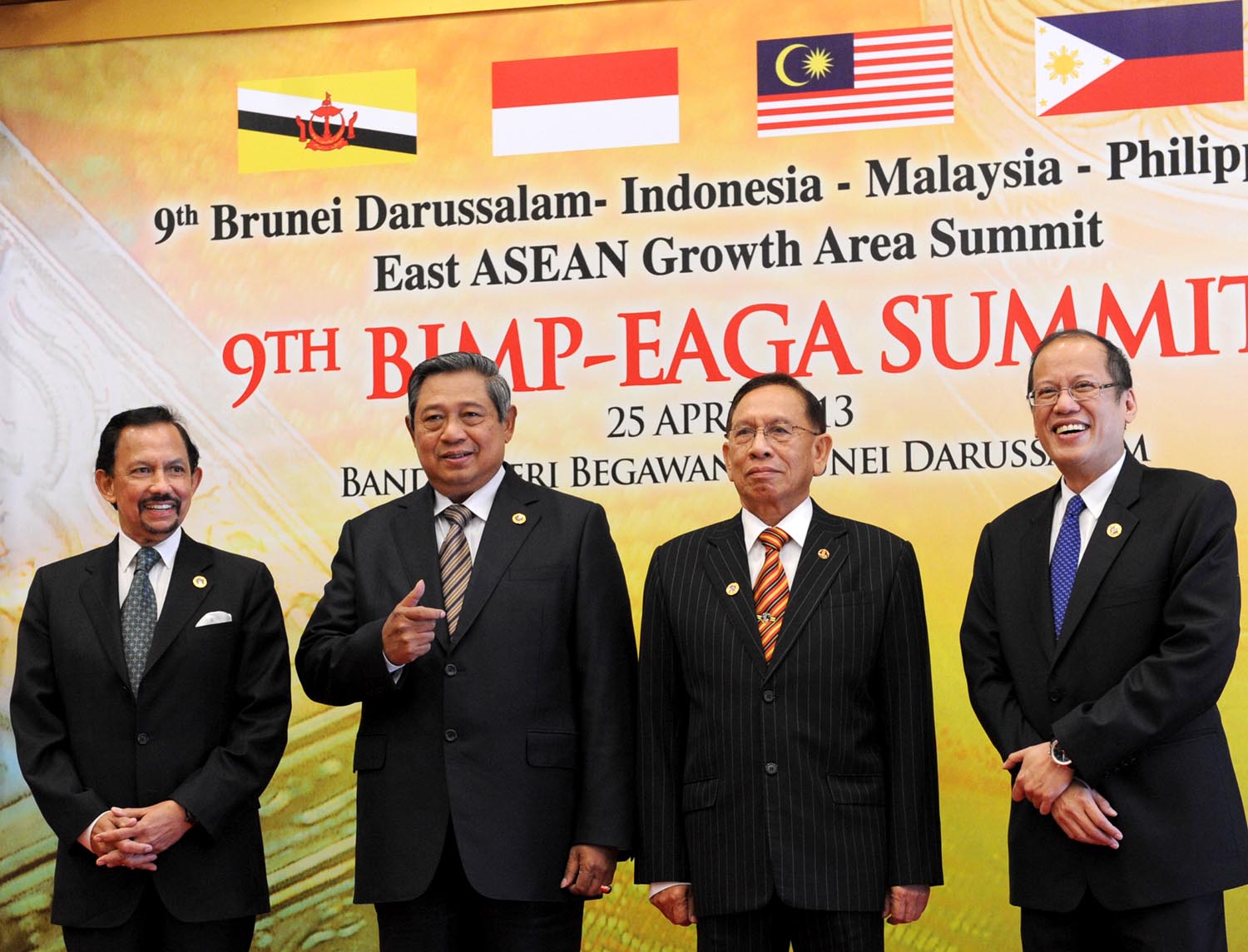
Brunei has one of the highest Human Development Index (HDI) scores in Southeast Asia, second only to Singapore, reflecting its high per capita income and social welfare provisions.
- Key Economic Indicators:
- GDP and Per Capita Income: Brunei enjoys a high GDP per capita. Forbes has previously ranked Brunei as one of the richest nations based on its petroleum and natural gas fields. However, GDP growth can be volatile, heavily influenced by global oil and gas prices.
- Inflation: Inflation has generally been low and stable.
- Unemployment: Unemployment, particularly among youth, has been a persistent concern. The unemployment rate was reported at 6.9% in 2014. The government is focused on creating more jobs for locals and reducing reliance on foreign labor.
- Wawasan Brunei 2035 (Brunei Vision 2035):
- This is Brunei's national long-term development plan, launched in 2008. Its goals are to transform Brunei into a nation widely recognized for:
1. The education, high skills, and accomplishments of its people.
2. A high quality of life.
3. A dynamic and sustainable economy.- Strategies under Wawasan Brunei 2035 focus on economic diversification, strengthening human capital, improving infrastructure, fostering innovation, ensuring environmental sustainability, and upholding good governance.
- Development plans increasingly incorporate considerations for environmental sustainability, given Brunei's rich biodiversity and reliance on natural resources.
- Labor rights are governed by national laws, but the influence of trade unions is limited. The large public sector employs a significant portion of the Bruneian workforce.
- Social equity is a key aspect of Brunei's welfare state, with the government providing extensive subsidies and services. However, ensuring equitable distribution of opportunities and addressing disparities remain ongoing challenges, particularly as the economy diversifies.
- The Global Innovation Index in 2024 ranked Brunei 88th.
The government has also promoted food self-sufficiency, especially in rice. In 2009, Brunei launched its Laila Rice, aiming to boost local rice production.
10.3. Trade and Investment

Brunei's external economic relations are dominated by its oil and gas exports and its reliance on imports for many consumer goods and foodstuffs.
- Main Export and Import Commodities:
- Exports: Crude oil and liquefied natural gas (LNG) are by far the largest export commodities, accounting for over 90% of total exports.
- Imports: Brunei depends heavily on imports for a wide range of goods, including machinery and transport equipment, manufactured goods, food products (Brunei imports about 60% of its food, with around 75% of that from ASEAN countries), chemicals, and consumer electronics.
- Major Trading Partners:
- Brunei's main export markets for oil and gas include Japan, South Korea, Thailand, Australia, and other Asian countries.
- Major sources of imports include Malaysia, Singapore, China, the United States, and other ASEAN countries.
- Foreign Direct Investment (FDI):
- The Bruneian government actively seeks to attract FDI to support its economic diversification goals, particularly in non-oil and gas sectors identified in Wawasan Brunei 2035.
- Policies to attract FDI include tax incentives, development of industrial parks, and efforts to improve the ease of doing business. However, challenges for investors can include the small domestic market, bureaucratic procedures, and labor regulations.
- Investment Climate:
- Brunei offers political stability and a strategic location in Southeast Asia. The legal system is based on English common law, which can be familiar to international investors. The establishment of the Brunei International Financial Centre (BIFC) aims to attract financial services investment.
- Brunei Investment Agency (BIA):
- The BIA is Brunei's sovereign wealth fund, an arm of the Ministry of Finance and Economy. It manages Brunei's substantial foreign reserves, derived from oil and gas revenues.
- The BIA invests globally across various asset classes, including equities, bonds, real estate, and private equity. These overseas investments provide a significant supplementary income stream for the country, helping to cushion against oil price volatility and fund national development.
Brunei is a member of the World Trade Organization (WTO) and participates in regional trade agreements through ASEAN, such as the ASEAN Free Trade Area (AFTA) and the Regional Comprehensive Economic Partnership (RCEP).
11. Infrastructure
Brunei Darussalam has developed a relatively modern infrastructure base, largely funded by its oil and gas revenues. This includes transportation networks, telecommunications, and financial systems.
This section describes the current state of Brunei's key infrastructure.
11.1. Transport
Brunei's transport infrastructure primarily relies on its road network, with a high rate of private car ownership.
- Road Network: As of 2019, Brunei had a total road network of 2.3 K mile (3.71 K km), of which approximately 2.0 K mile (3.22 K km) (about 87%) were paved. Major highways are generally well-maintained. The 84 mile (135 km) highway from Muara Town to Kuala Belait is a dual carriageway. A significant recent development is the Temburong Bridge (Sultan Haji Omar Ali Saifuddien Bridge), a 19 mile (30 km) bridge connecting the Brunei-Muara District with the Temburong District exclave. Opened in March 2020, it is the longest bridge in Southeast Asia and cost approximately 1.60 B BND. About 8.7 mile (14 km) of this bridge crosses Brunei Bay.
- Public Transport: Public transport options are limited, particularly outside the capital, Bandar Seri Begawan. Bus services exist but are not always comprehensive or frequent. Taxis are available but can be expensive and may need to be pre-booked.
- Car Ownership: Brunei has one of the highest car ownership rates in the world, with approximately one private car for every 2.09 persons. This is attributed to the limited public transport, low import taxes on vehicles, and subsidized fuel prices (unleaded petrol at around 0.53 BND per litre).
11.1.1. Aviation
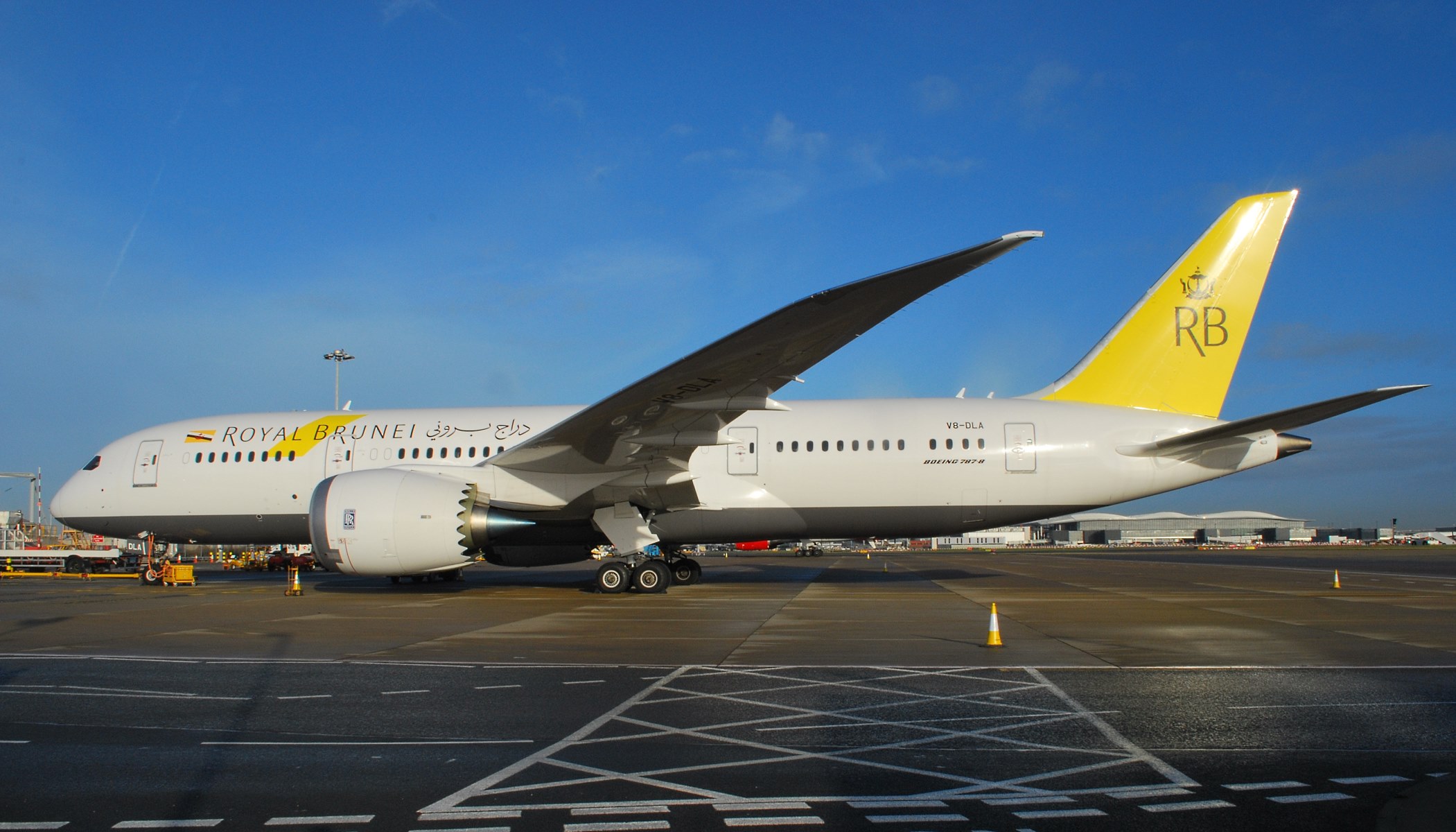
Air transport is centered around Brunei International Airport (BWN), located near Bandar Seri Begawan.
- Brunei International Airport (BIA): BIA is the main international gateway to Brunei. It has undergone significant upgrades to modernize its facilities and increase capacity, aiming to handle up to 3 million passengers annually. The airport serves as the hub for the national carrier.
- Royal Brunei Airlines (RB): Royal Brunei Airlines is the national flag carrier. It operates flights to various destinations in Southeast Asia, East Asia, Australia, the Middle East, and Europe (primarily London). RB plays a role in Brunei's efforts to develop itself as a travel hub.
- Anduki Airfield: Located in Seria, this airfield primarily serves the oil and gas industry and Brunei Shell Petroleum.
11.1.2. Maritime Transport
Maritime transport is crucial for Brunei's international trade, especially for the import and export of goods.
- Muara Port: Located in the Brunei-Muara District, Muara Port is Brunei's main deepwater port and commercial shipping hub. It handles various types of cargo, including containers, general cargo, and bulk commodities. It also has a dedicated cruise terminal. Regular ferry services connect Muara to Labuan, Malaysia.
- Other Water Transport: Speedboats provide essential passenger and goods transportation to the Temburong District, especially before the Temburong Bridge was completed, and continue to serve local routes.
11.2. Telecommunications
Brunei has a relatively well-developed Information and Communication Technology (ICT) infrastructure.
- Telephony: Landline and mobile phone penetration rates are high. Major telecommunications providers offer mobile services (3G, 4G, and increasingly 5G) and fixed-line services.
- Internet: Internet access is widely available, with increasing broadband penetration through fiber optic and mobile data services. Wi-Fi hotspots are common in urban areas. The government promotes digital literacy and e-government initiatives.
- Providers: Key players in the telecommunications sector include Telekom Brunei Berhad (TelBru), DST (Datastream Digital Sdn Bhd), and Progresif Cellular Sdn Bhd.
11.3. Finance
Brunei's financial sector is overseen by its central bank and includes both conventional and Islamic financial institutions.
- Autoriti Monetari Brunei Darussalam (AMBD): AMBD serves as the central bank of Brunei. Its responsibilities include formulating and implementing monetary policy, managing currency issuance (the Brunei Dollar, BND), regulating and supervising financial institutions, and fostering financial stability. The Brunei Dollar is maintained at par with the Singapore Dollar under a Currency Interchangeability Agreement.
- Commercial Banks: The banking sector comprises both local and international banks. This includes conventional banks like Standard Chartered Bank and Maybank, as well as Islamic banks such as Bank Islam Brunei Darussalam (BIBD), which is the country's largest bank. Bank of China also has a presence. Several international banks, such as Citibank and HSBC, have ceased operations in Brunei in recent years.
- Financial Industry Development: Brunei is working to develop its financial sector further, particularly in Islamic finance and as an international financial center, through initiatives like the Brunei International Financial Centre (BIFC).
12. Population and Society
Brunei Darussalam has a small population with a unique demographic profile, heavily influenced by its Malay Islamic Monarchy (MIB) philosophy. The society benefits from substantial oil wealth, which funds comprehensive social services.
This section covers Brunei's demographics, ethnic composition, languages, religions, and its education, health, and welfare systems.
12.1. Demographics
As of 2023, the population of Brunei was estimated at 455,858.
- Population Density: Brunei has a relatively low population density overall, but the population is concentrated in urban areas, particularly in the Brunei-Muara district.
- Birth and Death Rates: The country has moderate birth rates and low death rates, contributing to natural population growth.
- Sex Ratio and Age Structure: The population has a slightly higher proportion of males, partly due to foreign workers. The age structure is relatively young, though it is gradually aging.
- Urbanization Rate: Approximately 76% of the population lives in urban areas, with a steady urbanization trend.
- Life Expectancy: Life expectancy in Brunei is high, around 77.7 years, reflecting good access to healthcare and a high standard of living.
The religious composition of Brunei in 2021 was approximately:
- Islam: 362,035 adherents (82.1%)
- Christianity: 29,462 adherents (6.7%)
- Buddhism: 27,745 adherents (6.3%)
- Others/Non-religious: 21,473 adherents (4.9%)
12.2. Ethnic Composition
Brunei has a diverse ethnic makeup:
- Malays: The majority of the population (around 65.7% - 67.4%) are ethnically Malay. This category officially includes seven indigenous Malay groups (Puak Jati): Brunei Malay, Kedayan, Tutong, Belait, Bisaya, Dusun, and Murut (Lun Bawang). These groups share cultural and linguistic similarities but also have distinct traditions.
- Chinese: The Chinese community forms the largest non-indigenous minority group, accounting for about 10.3% of the population. They play a significant role in the country's commerce and business sectors.
- Other Indigenous Tribes: Besides the seven officially recognized Malay indigenous groups, there are other smaller indigenous communities. These groups, along with the officially recognized Malay indigenous groups (excluding Brunei Malay proper), constitute about 3.4% designated as "indigenous."
- Foreign Workforce: Brunei has a substantial expatriate community and foreign workforce, making up around 20.6% of the population. These workers come from various countries, including Indonesia, the Philippines, Malaysia, Bangladesh, India, and some Western countries, and are employed in sectors like construction, domestic services, and professional roles.
12.3. Language
- Official Language: Standard Malay (Bahasa Melayu BakuBahasa Məlayu Baku (Standard Malay)Malay) is the official language of Brunei, used in government, education, and official communications. It is written in both the Latin script (Rumi) and the Arabic-derived Jawi script.
- Brunei Malay (Bahasa Melayu BruneiBahasa Məlayu Brunaj (Brunei Malay)Malay or Bahasa BruneiBahasa Brunaj (Brunei Language)Malay): This is the most widely spoken vernacular language and the de facto national language for daily communication. While related to Standard Malay, Brunei Malay has distinct features in pronunciation, vocabulary, and grammar, and is about 84% cognate with Standard Malay.
- English: English is widely used as a language of business, administration, and education. It is taught as a core subject in schools and is the medium of instruction for many subjects, particularly at higher education levels. Many Bruneians are bilingual in Malay and English.
- Chinese Dialects: Various Chinese dialects, such as Hokkien, Hakka, and Mandarin, are spoken within the Chinese community.
- Minority and Indigenous Languages: Other indigenous languages spoken include the Kedayan language, Tutong language, Belait language, Brunei Bisaya, Dusun language, and Lun Bawang/Murut. These languages are generally used within their respective communities.
- Arabic: Arabic is used for religious purposes, particularly in Islamic education and Quranic studies.
12.4. Religion
Islam is the official religion of Brunei, and its influence is pervasive in society.
- Islam: Approximately 82.1% of the population is Muslim, predominantly adherents of the Sunni denomination and the Shafi'i school of Islamic jurisprudence. Islam plays a central role in national identity, governance, and daily life, as reflected in the MIB philosophy.
- Buddhism: About 6.3% of the population, mainly from the Chinese community, practice Buddhism.
- Christianity: Christians constitute about 6.7% of the population and include various denominations (Catholic, Anglican, Evangelical). The Christian community consists of indigenous people, Chinese, and expatriates.
- Other Religions and Beliefs: A small percentage of the population (around 4.9%) adheres to indigenous beliefs, other faiths, or are non-religious/freethinkers (often among the Chinese community who may practice folk religions with elements of Buddhism, Confucianism, and Taoism but identify as having no official religion).
Freedom of religion is constitutionally guaranteed but is subject to restrictions, particularly for non-Muslims regarding proselytization and public religious expression.
12.4.1. Islam
Islam is deeply embedded in Bruneian society and governance.
- State Religion: As the official state religion, Islam (Sunni, Shafi'i school) receives strong state support. The Ministry of Religious Affairs oversees Islamic matters.
- Religious Education: Islamic religious education is compulsory for Muslim children in government schools and is also provided through religious schools (sekolah ugama).
- Islamic Holidays and Events: Major Islamic holidays such as Hari Raya Aidilfitri (Eid al-Fitr), Hari Raya Aidiladha (Eid al-Adha), Maulidur Rasul (Prophet Muhammad's Birthday), and Israk Mikraj are national public holidays and widely celebrated.
- Mosques: Mosques are prominent landmarks and centers of community life. Notable mosques include the Sultan Omar Ali Saifuddien Mosque and the Jame'Asr Hassanil Bolkiah Mosque.
- Application of Sharia Law: Brunei has implemented Sharia law in phases, which applies to Muslims in various aspects of life, including criminal justice, family matters, and personal conduct. This has significant social implications, reinforcing conservative Islamic values.
12.4.2. Other Religions
Minority religious communities, primarily Buddhists and Christians, practice their faiths in Brunei, but under certain constraints.
- Places of Worship: Established churches and Buddhist temples exist, mainly in urban areas. However, the construction of new non-Muslim places of worship is highly restricted.
- Freedom of Religious Activity: Non-Muslims are generally allowed to worship within their registered places of worship and private homes. Public religious processions or displays by non-Muslims are usually not permitted.
- Legal and Social Constraints: Proselytizing to Muslims by non-Muslims is illegal. The importation of non-Islamic religious materials may be restricted. Non-Muslims may face social pressure in a predominantly Islamic society. The overall environment for religious minorities is one of tolerance within defined limits, but full religious freedom as understood in more secular contexts is not present.
12.5. Education
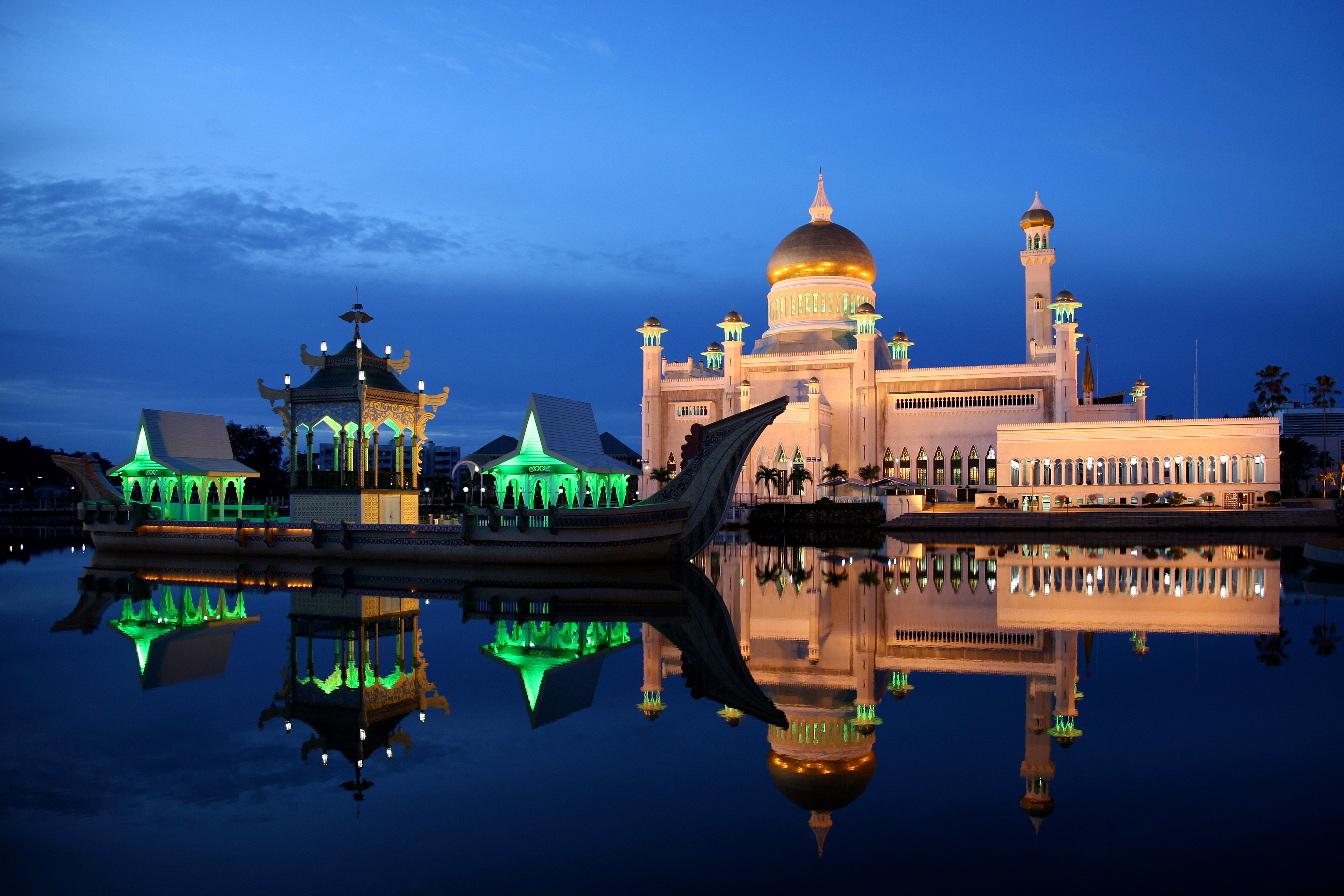
Brunei offers a comprehensive education system with significant government funding, making education largely free for its citizens from primary to tertiary levels.
- Structure: The education system generally follows a 6-3-2-2 pattern: 6 years of primary education, 3 years of lower secondary, 2 years of upper secondary (leading to GCE 'O' Level examinations), and 2 years of pre-university (leading to GCE 'A' Level examinations).
- Compulsory Education: Education is compulsory for children, typically from age 6.
- Medium of Instruction: Malay is the primary medium of instruction in early primary years, with a bilingual policy (Malay and English) implemented from mid-primary onwards. English is widely used for subjects like mathematics, science, and technical education, especially at secondary and higher levels.
- Higher Education:
- Universiti Brunei Darussalam (UBD): Established in 1985, UBD is the oldest and largest public university in Brunei, offering a range of undergraduate and postgraduate programs.
- Other institutions of higher learning include Universiti Islam Sultan Sharif Ali (UNISSA) focusing on Islamic studies, Universiti Teknologi Brunei (UTB) focusing on engineering and technology, and Politeknik Brunei offering vocational and technical diplomas.
- Religious Education: Islamic religious education (Pendidikan Ugama Islam) is compulsory for Muslim students and is provided through government religious schools, often attended in the afternoon after regular school hours.
- Educational Policies and Funding: The government heavily invests in education as part of its human capital development goals under Wawasan Brunei 2035. Scholarships are available for students to study locally and abroad.
- International Schools: Several international schools cater to the expatriate community and some Bruneian students, offering curricula such as the British or International Baccalaureate systems.
12.6. Health
Brunei provides a comprehensive national healthcare service system, which is heavily subsidized by the government, making healthcare virtually free for citizens.
- Healthcare System: The Ministry of Health oversees the public healthcare system. Services are delivered through a network of government hospitals, health centers, and clinics across the country.
- Major Hospitals and Medical Facilities:
- Raja Isteri Pengiran Anak Saleha (RIPAS) Hospital: Located in Bandar Seri Begawan, RIPAS is the main national referral hospital, offering a wide range of specialist services and facilities. It has around 538 beds.
- District hospitals are located in Kuala Belait (Suri Seri Begawan Hospital) and Tutong.
- There are also private medical facilities, such as Gleneagles JPMC Sdn Bhd, offering specialized services like cardiac care.
- Public Health Standards: Brunei has achieved high public health standards, with good sanitation, access to clean water, and successful immunization programs. Life expectancy is high.
- Prevalent Diseases: Like many developed nations, Brunei faces challenges from non-communicable diseases (NCDs) such as diabetes, heart disease, and cancer, linked to lifestyle factors. Communicable diseases are generally well-controlled.
- Healthcare Funding and Overseas Treatment: The government funds the vast majority of healthcare services. For specialized treatments not available in Brunei, citizens are often sent overseas (e.g., to Singapore or Malaysia) at government expense. In 2011-12, 327 patients were treated overseas at a cost of 12.00 M USD covered by the government.
12.7. Welfare
Brunei Darussalam is known for its extensive social welfare system, funded by its substantial oil and gas revenues. This system aims to ensure a high quality of life for its citizens and is a key component of the state's social contract.
- Free Education and Healthcare: As mentioned, education from primary to tertiary levels and healthcare services are provided free of charge or at highly subsidized rates for Bruneian citizens.
- Housing Assistance: The government provides various housing assistance schemes, including subsidized housing and land allocation programs, to help citizens own homes. The National Housing Scheme (Rancangan Perumahan NegaraRancangan Pərumahan Nəgara (National Housing Scheme)Malay) is a major initiative.
- Old-Age Pensions: Citizens are entitled to old-age pensions upon reaching retirement age, providing a safety net for the elderly.
- Subsidies: The government provides subsidies for essential goods and services, including rice, sugar, and fuel (petrol), which helps keep the cost of living manageable.
- Welfare Assistance for Vulnerable Groups: Financial and other forms of assistance are provided to vulnerable groups, such as the poor, disabled, and single mothers, through the Ministry of Culture, Youth and Sports.
- No Personal Income Tax: Bruneian citizens do not pay personal income tax, which further contributes to their disposable income.
This comprehensive welfare system is a hallmark of Brunei's socio-economic model. However, its long-term sustainability is linked to the country's oil and gas revenues and the success of economic diversification efforts. The system fosters social stability but can also create a dependency on state support.
13. Culture
The culture of Brunei Darussalam is predominantly Malay and deeply influenced by Islam, reflecting the national philosophy of Melayu Islam Beraja (MIB). It shares many similarities with the cultures of neighboring Malaysia and Indonesia but is often seen as more conservative.
This section introduces Brunei's traditional culture, lifestyle, cuisine, arts, mass media, sports, and public holidays.
13.1. Traditions and Lifestyle
Bruneian traditions and lifestyle are shaped by a blend of Malay customs (adat) and Islamic teachings.
- Values: Key values include respect for elders and authority (especially the monarchy), filial piety, community cohesion (gotong-royong), modesty, and adherence to Islamic principles.
- Family Structure: The family is the central unit of society, with strong kinship ties. Extended families living together or in close proximity are common.
- Traditional Attire:
- Men traditionally wear the Baju Melayu, a loose tunic and trousers, often with a Songkok (cap) and a Samping (a sarong-like cloth tied around the waist). This is common for formal occasions, religious events, and Friday prayers.
- Women traditionally wear the Baju Kurung (a loose-fitting long-sleeved blouse and skirt) or Baju Kebaya, and Muslim women typically wear a Tudong (headscarf).
- Daily Life and Customs:
- Greetings often involve a gentle handshake (salam), and it is customary to show respect when interacting with elders.
- Shoes are typically removed before entering a home or a place of worship.
- Pointing with the index finger is considered impolite; the thumb is used instead.
- Public displays of affection are generally frowned upon.
- Prohibition of Alcohol: The sale and public consumption of alcohol are prohibited in Brunei. Non-Muslims are allowed to import a limited amount for private consumption.
- Life often revolves around family, community, and religious observances.
13.2. Food Culture
Bruneian cuisine shares many similarities with Malay and Indonesian food, featuring rice as a staple, accompanied by various dishes using spices, coconut milk, and chili.
- Ambuyat: This is considered Brunei's national dish. It is a sticky, starchy substance derived from the interior trunk of the sago palm. Ambuyat is typically eaten with a bamboo fork called a chandaschandas (bamboo fork)Malay, by twirling it and dipping it into various sauces (cacahchachah (sauce)Malay), often sour or spicy, such as tempoyaktəmpoyak (fermented durian sauce)Malay (fermented durian sauce) or fish-based sauces. It is usually served with a variety of side dishes like grilled fish, vegetables, and curries.
- Other Major Dishes:
- Nasi Katok: A simple and popular meal consisting of plain rice, a piece of fried chicken (or beef), and sambal (chili paste), usually wrapped in paper or a plastic container.
- Nasi Lemak: Fragrant rice cooked in coconut milk, served with anchovies, peanuts, boiled egg, cucumber, and sambal.
- Rendang: A rich and spicy meat dish (beef, chicken, or lamb) slow-cooked in coconut milk and spices.
- Satay: Grilled skewered meat served with peanut sauce.
- Various seafood dishes, given Brunei's coastline.
- Ingredients: Common ingredients include rice, coconut milk, chili, lemongrass, galangal, turmeric, and various local herbs and vegetables.
- Halal Food Culture: As an Islamic country, food preparation and consumption strictly adhere to halal principles. All meat served must be halal.
- Dining Etiquette: Meals are often communal. It is customary to eat with the right hand, though cutlery is also commonly used. When dining as a guest, it is polite to accept food and drink offered.
13.3. Arts
Bruneian arts reflect a blend of indigenous Malay traditions and Islamic influences.
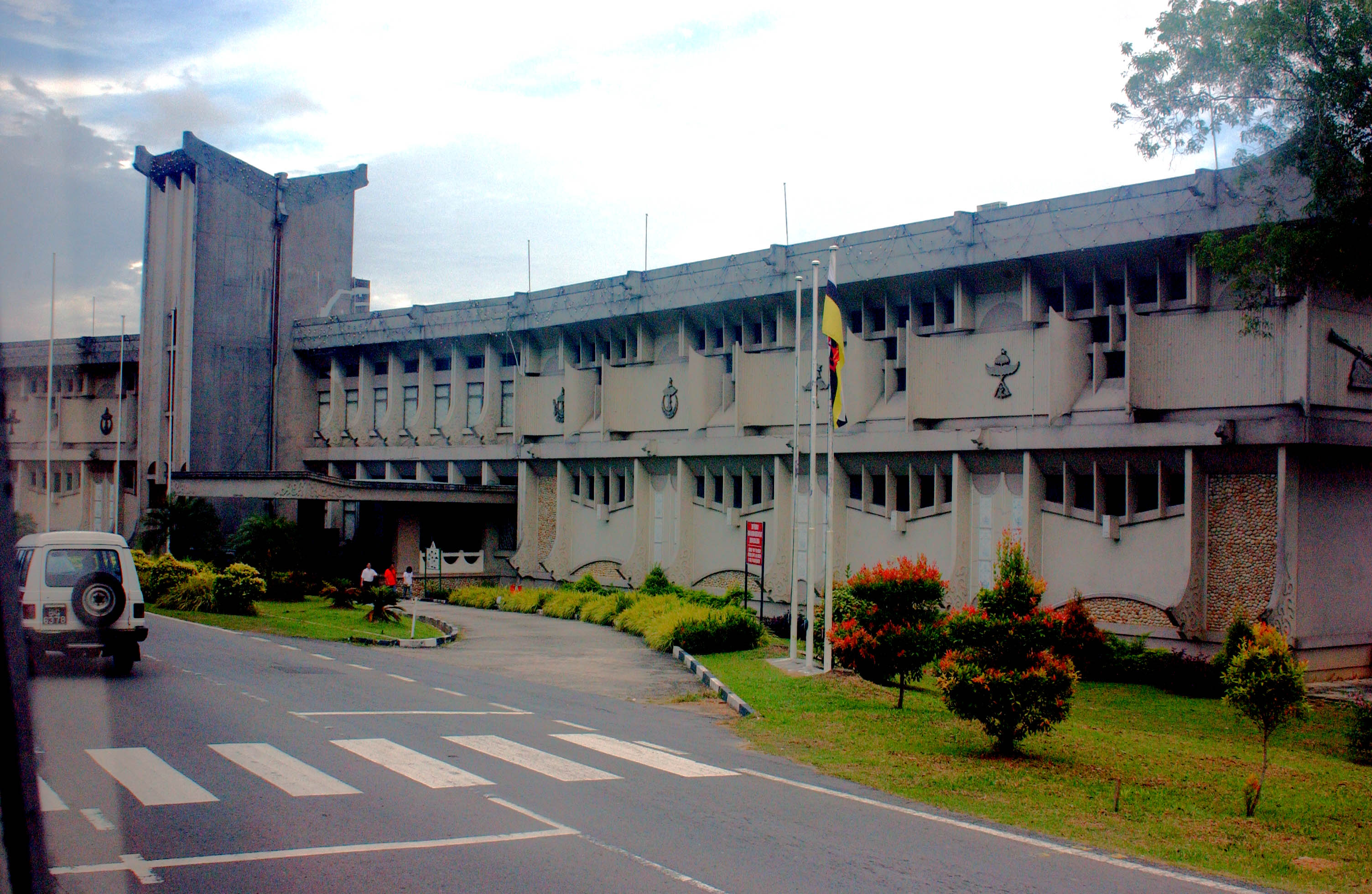
- Traditional Music:
- Gulintangan (GulintanganGulintangan (musical ensemble)Malay): This is a traditional Bruneian musical ensemble, similar to the gamelan. It typically consists of a set of small, knobbed gongs arranged in a row, accompanied by larger suspended gongs and drums (gendanggəndang (drum)Malay). Gulintangan music is often played at weddings, festivals, and official ceremonies.
- Other traditional instruments include the gambusgambus (lute)Malay (a type of lute) and various percussion instruments.
- Traditional Dance:
- Adai-adai (Adai-adaiAdai-adai (fishermen's dance)Malay): A traditional group dance performed by fishermen, depicting their daily lives and activities at sea.
- Alai Sekap (Alai SekapAlai Səkap (Tutong dance)Malay): A dance from the Tutong ethnic group.
- Zapin: A popular Malay dance with Arabic influences, often performed at social gatherings.
- Crafts:
- Kain Tenunan (Kain TenunanKain Tənunan (Woven Cloth)Malay): Brunei is known for its intricately woven textiles, particularly the Jong SaratJoŋ Sarat (brocade fabric)Malay, a brocade fabric with gold or silver threads, often used for ceremonial attire.
- Silversmithing: Brunei has a tradition of fine silversmithing, producing items like bowls, containers, and traditional jewelry.
- AnyamanAnyaman (basket weaving)Malay (basket weaving): Various types of baskets and mats are woven from natural materials like pandanus leaves and rattan.
- Kris-making (traditional daggers).
- Contemporary Art: A contemporary art scene is emerging in Brunei, with local artists exploring various mediums and themes. Art galleries and exhibitions showcase their work.
- Architecture:
- Traditional Malay houses on stilts (rumah panggungrumah pangguŋ (stilt house)Malay) are characteristic, especially in the water village of Kampong Ayer.
- Islamic architecture is prominent, exemplified by the magnificent Sultan Omar Ali Saifuddien Mosque (completed in 1958) with its golden dome, and the Jame'Asr Hassanil Bolkiah Mosque (completed in 1994), known for its grand scale and intricate details.
- The Istana Nurul Iman, the official residence of the Sultan, is one of the largest residential palaces in the world and a significant architectural landmark.
13.3.1. Traditional Performing Arts
Brunei's traditional performing arts are an integral part of its cultural heritage, often showcased during festivals, official events, and community celebrations.
- Traditional Dances:
- Adai-adai: A lively dance performed by groups of men and women, often depicting the lives and work of fishermen. It involves synchronized movements and traditional music, typically featuring gulintangan and drums.
- Alai Sekap: A traditional dance of the Tutong ethnic group, usually performed during harvest festivals and other celebrations. It involves dancers moving in a circle, accompanied by singing and the rhythmic stamping of bamboo poles.
- Zapin: A popular Malay dance with influences from Arab traders, characterized by graceful footwork and hand movements. It is often performed in pairs or groups at weddings and cultural events, accompanied by gambus, accordion, and percussion.
- Other folk dances specific to various ethnic groups also exist.
- Folk Music:
- Besides Gulintangan ensembles, folk music includes vocal traditions, narrative songs (syairsyair (narrative songs)Malay), and music accompanying specific rituals or ceremonies.
- Silat:
- Silat is the traditional Malay martial art, encompassing various styles and techniques. It is not only a form of self-defense but also a cultural performance, often demonstrated at festivals with accompanying music. Silat Suffian Bela Diri is a notable Bruneian style.
- Festivals and Performances:
- Traditional performing arts are prominently featured during national celebrations like the Sultan's Birthday, National Day, and Islamic holidays like Hari Raya. Cultural festivals and village events also provide platforms for these performances.
13.3.2. Modern Arts and Museums
While traditional arts hold a strong place, Brunei also has a developing modern arts scene and several museums that preserve and showcase its cultural and historical heritage.
- Modern and Contemporary Bruneian Art:
- A growing number of Bruneian artists are exploring contemporary art forms, including painting, sculpture, digital art, and photography. Their work often reflects local themes, cultural identity, and social commentary, sometimes blending traditional motifs with modern techniques.
- Art exhibitions are held periodically, providing platforms for emerging and established artists. However, the contemporary art infrastructure (galleries, funding, and critical discourse) is still developing compared to larger regional art centers.
- Major Art Galleries and Museums:
- Royal Regalia Museum (Muzium Alat Kebesaran DirajaMuzium Alat Kəbəsaran Diradʒə (Royal Regalia Museum)Malay): Located in Bandar Seri Begawan, this museum showcases the royal regalia of the Sultan of Brunei, including crowns, ceremonial costumes, royal chariots, gifts from foreign dignitaries, and exhibits related to the life and reign of Sultan Hassanal Bolkiah and the history of the monarchy.
- Brunei Museum (Muzium BruneiMuzium Brunaj (Brunei Museum)Malay): Situated on a hill overlooking the Brunei River, the Brunei Museum is the national museum. Its collections cover Bruneian history, archaeology, ethnography (including traditional crafts and lifestyles of various ethnic groups), natural history, and Islamic art. It has undergone renovations at various times.
- Malay Technology Museum (Muzium Teknologi MelayuMuzium Teknolodʒi Məlaju (Malay Technology Museum)Malay): Located near the Brunei Museum, this museum focuses on the traditional technologies and crafts of the Malay people in Brunei, particularly those related to house-building, boat-making, fishing, and metalworking in Kampong Ayer.
- Brunei History Centre (Pusat Sejarah BruneiPusat Sədʒarah Brunaj (Brunei History Centre)Malay): Dedicated to the research, documentation, and dissemination of Bruneian history, including the genealogy of the Sultans.
- Other smaller museums and galleries may focus on specific themes like postal history or Islamic calligraphy.
These institutions play a crucial role in preserving Brunei's heritage and educating the public and visitors about its rich culture and history.
13.4. Mass Media
The media landscape in Brunei is largely pro-government, with limited freedom of the press and expression. Criticism of the government, the monarchy, or the national philosophy of MIB is rare due to a combination of state ownership, legislation, and a culture of self-censorship.
- Newspapers:
- Borneo Bulletin: An English-language daily newspaper, it is one of the oldest and most prominent newspapers in Brunei. It covers local, regional, and international news. While generally reflecting official viewpoints, it provides news coverage on various topics. It began as a weekly community paper in 1953 and became a daily in 1990.
- Media Permata: A Malay-language daily newspaper, serving the Malay-speaking population.
- The Brunei Times: An independent English-language newspaper published from 2006 until its abrupt closure in 2016, which raised concerns about press freedom.
- Broadcasting:
- Radio Television Brunei (RTB): The state-owned national broadcaster. RTB operates several television channels (e.g., RTB Perdana, RTB Aneka, RTB Sukmaindera) and radio stations (e.g., Nasional FM, Pilihan FM, Nur Islam FM). Programming includes news, entertainment, religious content, and government information, generally aligning with state narratives.
- Internet and Social Media:
- Internet penetration is high in Brunei, and social media platforms are popular among the population for communication and information sharing.
- While citizens use social media, laws such as those related to sedition, defamation, and public order can be applied to online content, leading to self-censorship.
- Press Freedom and Government Control:
- Brunei consistently ranks low in international press freedom indices. Freedom House has rated its media as "Not Free."
- The government maintains significant control over the media through ownership, licensing, and legal frameworks. Laws such as the Sedition Act and regulations on publications can be used to restrict critical reporting.
- Journalists often practice self-censorship to avoid repercussions.
From a center-left/social liberalism perspective, the lack of media independence and the restrictions on freedom of expression are significant concerns, limiting public discourse and accountability.
13.5. Sports
Sports are popular in Brunei, with participation at both recreational and competitive levels. The government supports sports development through the Ministry of Culture, Youth and Sports.
- Popular Sports:
- Football (Soccer): Football is the most popular sport in Brunei. The national team competes in regional and international tournaments. The top domestic league is the Brunei Super League, managed by the Football Association of Brunei Darussalam (FABD).
- Badminton: Badminton is widely played and is a popular recreational sport.
- Sepak takraw: This traditional Southeast Asian sport, similar to volleyball but played with the feet and head, is also popular.
- Silat: The traditional Malay martial art is practiced for sport, self-defense, and cultural preservation.
- Other popular sports include netball, basketball, athletics, and various water sports.
- Domestic Leagues and Competitions:
- Domestic leagues and competitions are organized for various sports, providing a platform for local athletes.
- International Competitions:
- Brunei participates in major multi-sport events such as the Southeast Asian Games (SEA Games), where its athletes have won medals in various disciplines. According to the all-time SEA Games medal table, Bruneian athletes have won 14 gold, 55 silver, and 163 bronze medals.
- Brunei also competes in the Asian Games (winning four bronze medals) and the Olympic Games. Brunei debuted at the Olympics in 1996 and has competed in sports like badminton, shooting, swimming, and track and field, though it has yet to win an Olympic medal. The Brunei Darussalam National Olympic Council is the National Olympic Committee.
- The 1999 Southeast Asian Games were hosted in Brunei.
The nation also has its own martial art called "Silat Suffian Bela Diri."
13.6. Public Holidays
Brunei Darussalam observes a number of public holidays, which include national holidays commemorating significant historical events and Islamic religious holidays based on the Hijri lunar calendar. The dates for Islamic holidays vary each year according to the lunar cycle.
- National Holidays:
- January 1: New Year's Day
- February 23: National Day - Commemorates Brunei's full independence in 1984.
- May 31: Royal Brunei Armed Forces Day - Celebrates the anniversary of the Royal Brunei Armed Forces.
- July 15: Sultan's Birthday - Celebrates the birthday of the reigning Sultan, His Majesty Sultan Hassanal Bolkiah.
- December 25: Christmas Day (Observed as a public holiday, though public displays of Christmas decorations are restricted).
- Islamic Religious Holidays:
- Israk Mikraj (The Prophet Muhammad's Night Journey and Ascension)
- First Day of Ramadan (Beginning of the fasting month)
- Nuzul Al-Quran (Anniversary of the Revelation of the Quran)
- Hari Raya Aidilfitri (End of Ramadan) - Celebrated for several days, typically one of the most significant festive periods.
- Hari Raya Aidiladha (Festival of Sacrifice)
- Islamic New Year (Awal Tahun Hijrah)
- Prophet Muhammad's Birthday (Maulidur Rasul)
- Other Public Holidays:
- Chinese New Year: Celebrated by the Chinese community, usually a one-day public holiday.
If a public holiday falls on a Friday or Sunday (which are part of the weekend in Brunei, with Friday being particularly important for Muslim congregational prayers), a substitute holiday is often declared on the preceding or succeeding weekday. The government officially announces the dates for Islamic holidays based on moon sightings. These holidays reflect the country's MIB (Malay Islamic Monarchy) philosophy, blending national identity with Islamic traditions.